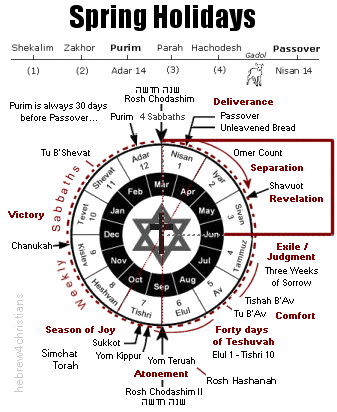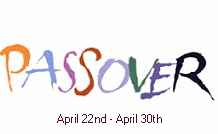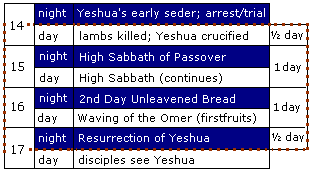|
Jewish Holiday Calendar
Note: For May 2016 site updates, please scroll past this entry....
Spring is the start of the Biblical Year and is marked by two of the Shelosh Regalim (three annual pilgrimage festivals): Pesach (Passover) and Shavuot (Pentecost). The holiday of Shavuot is held seven weeks (or fifty days) following the morning after Pesach.
The Spring Holidays:

The spring holidays provide a portrait of the death, burial, and resurrection of the Messiah: Yeshua was crucified on erev Pesach, buried during Chag Hamotzi, and was resurrected on Yom Habikkurim (Firstfruits). Shavuot (i.e., the feast of Pentecost) was the day the Ruach HaKodesh (Holy Spirit) fell on believers in fulfillment of the promise given by our Lord.
Note that in accordance with tradition, the following holiday dates begin at sundown:
- Month of Adar II (Wed., March 9th [eve] - Fri. April 8th [day])
- Month of Nisan (Fri. April 8th [eve] - Sat. May 7th [day])
- Month of Iyyar (Sat. May 7th [eve] - Mon. June 6th [day])
- Month of Sivan (Mon. June 6th [eve] - Tues. July 5th [day])
Note: Because this is a Jewish leap year, the holiday of Passover -- and particularly the Festival of Firstfruits -- will not occur near the traditional date of "Easter" or "Resurrection Sunday" as it is often called in the Gregorian calendar... For more information, see the Calendar Pages....
Dates for Passover 2016:
Free Seder Guide
May 2016 Updates
Note: If any page content appears to be missing, please refresh the page...
Providential Darkness...
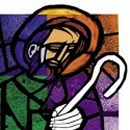
[ The following is related to our Torah reading for this week, parashat Bechukotai... ]
05.31.16 (Iyyar 23, 5776) "But if in spite of this [i.e., the various divine judgments for disobedience] you will not listen to me, but walk contrary to me, then I will walk contrary to you..." (Lev. 26:26-27). Since everything is under the Divine Supervision (i.e., hashgachah pratit: הַשְׁגָחָה פְּרָטִית), it is forbidden to regard actions and outcomes as the result of accident, chance, "luck," or happenstance... Those are all pagan ideas, based in ignorance and superstition. Faith in the LORD God Almighty is grounded in unqualified trust that He is also Adonai Ro'i (יהוה רעי), the LORD your Shepherd, the One who restores your soul, and that conviction provides the framework for apprehending the truth of Torah. A lost faith regards the events of life as random, based on "fortune," and blind chance; it no longer sees God's hand in the affairs of daily life, but consigns the Divine Presence to a place of functional exile. For this the "like for like" judgment is given: as you regard your life as the product of random forces, so you will be unable to discern God's hand in your daily life.
For more on this subject, see "The Tochechah: Further Thoughts on Bechukotai."
 |
Dangers of Carelessness...
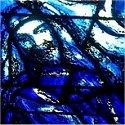
[ The following is related to our Torah reading for this week, parashat Bechukotai... ]
05.31.16 (Iyyar 23, 5776) This week's Torah portion includes the first great "rebuke" (i.e., tochachah: תּוֹכָחָה) of the community of Israel given in the Scriptures (the second is found in Ki Tavo, i.e., Deut. 28:15-68). In this sober and ominous section, God promises the people great blessing if they would obey Him (Lev. 26:3-13), but He forewarns that exile, persecution and other progressively worse punishments would befall them if they would break faith with Him (Lev. 26:14-46). The sages note that divine censure would come if the people "forgot" about God or otherwise became careless in their observance of His laws. They point out that the refrain "if you walk contrary to me" (וַהֲלַכְתֶּם עִמִּי בְּקֶרִי) - which occurs several times during the rebuke - really means "if you walk carelessly (i.e., keri: קְרִי) with me." Rashi notes that the verb קָרָה means "to befall" or "to happen" and therefore suggests a sense of randomness (the related word mikreh [מִקְרֶה] means "coincidence"). If the people regarded the events of life as "random," then God would reciprocate by bringing senseless trouble into their lives... For this reason the sages regard a careless attitude about God's will as the very first step to inevitable apostasy. In other words, regarding whatever happens in life as mere "coincidence" essentially denies God's Presence (hashgachah pratit), and this attitude will eventually call for God's corrective intervention. People may be "hot or cold" regarding their relationship with Him, but God will never give the option of affecting indifference toward Him... Indeed, God often brings hardship into our lives to regain our attention and cause us to return to Him. As C.S. Lewis once said, "God whispers to us in our pleasures, speaks to us in our conscience, but shouts in our pains: It is His megaphone to rouse a deaf world."
The portion begins, "If you walk in my statutes (i.e., bechukotai: בְּחֻקּתַי) and guard my commandments and you do them..." (Lev. 26:3), which led Rabbi Hanina to ask why the seemingly superfluous phrase, "and you do them" (וַעֲשִׂיתֶם אתָם) was included here. After all, if the people would walk in God's statutes and guard his commandments, wouldn't they necessarily be doing them? He then suggested that the vowels of the word otam ("them") should be vocalized as atem (אַתֶּם), "you," which would then change the sense of the phrase to become, "you shall make (עָשָׂה) yourselves" (i.e., into God's image). The logical corollary of this seems to imply that if you do not walk in God's statutes and guard his commandments, you will disfigure the image of God within you...
Interestingly, God specifically cites the failure to observe the Sabbatical Year (shemittah), mentioned in last week's Torah portion, as part of the reason why His judgment would come (Lev. 26:34-35,43). The observance of the Sabbatical Year, of course, required complete faith that God was in control of all the "happenings" of nature. Like the Sabbath day, the Sabbatical year was designated to proclaim that God is the King of the universe. Those who disregarded this law therefore denied God's rule over nature, and thereby denied the existence of spiritual reality that ultimately governs the physical world...
יִרְאַת יְהוָה רֵאשִׁית דָּעַת
חָכְמָה וּמוּסָר אֱוִילִים בָּזוּ
yir·at Adonai rei·shit da·at,
chokh·mah u·mu·sar e·vi·lim ba·zu

"The fear of the LORD is the beginning of knowledge;
fools despise wisdom and instruction."
(Prov. 1:7)
For more on this subject, see "The Tochechah: Further Thoughts on Bechukotai."
Walk in the truth...
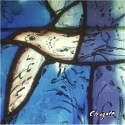
05.31.16 (Iyyar 23, 5776) From our Torah portion this week (Bechukotai) we read: "If you walk in my decrees (אִם־בְּחֻקּתַי תֵּלֵכוּ) and guard my commandments (ואֶת־מִצְוֹתַי תִּשְׁמְרוּ) and do them (וַעֲשִׂיתֶם אתָם), then I will give you your rains in their season, and the land shall yield its increase, and the trees of the field shall yield their fruit" (Lev. 26:4). Note the order in this verse: first we learn to walk in God's "decrees" and then we do his "commandments," which teaches us that the fear of God, the respect for His authority, must come first. Note also the connection between our reverence before the Divine Presence and its effect on our physical environment. When we walk in the will of God, yielding our hears to his direction (Torah), we become vessels of his presence in the world and conduits of blessing to our surroundings. Indeed, as we yield to God's truth, even the sword of our enemies will be unable to be used against us and we walk in peace (Lev. 26:6; Prov. 16:7).
Note: The Torah commentator Rashi says that the phrase, "if you walk in my decrees" refers to labor in the study of Torah (i.e., limud Torah: לימוד תורה), since we cannot mindfully observe God's decrees (chukkim) and commandments (mitzvot) without first studying Torah... As it says in our Sciptures: "Make yourself diligent (σπούδασον σεαυτὸν) to be genuine before God, a workman that is unashamed, living the message of truth accurately" (2 Tim. 2:15). "If you will walk" is an invitation to grow in grace and understanding of God's truth.
אֲנִי יְהוָה אֱלהֵיכֶם
אֲשֶׁר הוֹצֵאתִי אֶתְכֶם מֵאֶרֶץ מִצְרַיִם
מִהְית לָהֶם עֲבָדִים
וָאֶשְׁבֹּר מטת עֻלְּכֶם
וָאוֹלֵךְ אֶתְכֶם קוֹמְמִיּוּת
a·ni Adonai E·lo·he·khem
a·sher ho·tzei·ti et·khem me·e·retz mitz·ra·yim
mih·yot la·hem a·va·dim
va·esh·bor mo·tot u·le·khem
va·o·lekh et·khem ko·me·mi·yut

"I am the LORD your God
who brought you out of the land of Egypt, that you should not be their slaves.
And I have broken the bars of your yoke and made you walk upright."
(Lev. 26:13)
(Note again the connection between freedom from slavery and walking in righteousness.... Anyone who cries out for "freedom" - social, economic, ethical, political - without advocating it as a means to serving God does not know the true meaning of freedom...)
Always the First Step...

[ The following is related to our Torah reading for this week, parashat Bechukotai... ]
05.31.16 (Iyyar 23, 5776) There is a core element of your spiritual life that is all-determinative, that affects everything else, and that is the question of whether you will choose to "show up," whether you will engage it's hope; and whether you will open your eyes and yield yourself to the light... This is an ongoing decision. Our Torah portion for this week begins, "If you walk in my statutes (אִם־בְּחֻקּתַי תֵּלֵכוּ) and observe my commandments and do them..." (Lev. 26:3). The sages note that unlike the holy angels, we must "walk out" the faith of our days, and therefore we are always moving either forward or backward. God's sun shines on the just and unjust alike (Matt. 5:45). Every human being lives by faith of some kind, and it is therefore impossible to opt out of the decision to "choose this day whom we shall serve" (Josh. 24:15). Indifference or apathy is as much a spiritual decision as is outright rebellion, and if we do nothing today to draw us near to the Lord, we will eventually regress and slip backward. This is all very sobering. "No one knows the day or hour," and that's why it is so vital to turn to God and be healed while there is still time. So turn today and bacharta ba'chayim (בָּחַרְתָּ בַּחַיִּים) - "choose life!" "For this commandment (of turning to God) is not hidden from you, and it is not far away... No, the matter is very near you - in your mouth and your heart - to do it" (Deut. 30:11-14; Rom. 10:8-13).
Note: What's perhaps most heroic about Job is that he never turned away from hope, despite the crucifixion of his world. As Kierkegaard said, "The moment the LORD took everything away, he did not say, 'The LORD took away,' but first of all he said, 'The LORD gave..." (Upbuilding Discourses). Amen: יהוה נָתַן ויהוה לָקָח. His later words of protest were born of faith's deep struggle: "Where are you, God? Have you not promised never to leave me? Why am I alone in this pain, blind to your Presence?" Job's struggle to vindicate God's goodness and love despite inexplicable suffering was not a problem of unbelief, but rather a problem of how to reconcile the gap between present reality and the expectation of hope...
 |
Memorial Day...

05.30.16 (Iyyar 22, 5776) In the United States, Memorial Day is a national holiday observed on the last Monday of the month of May, that commemorates the sacrifice of those men and women who died in military service for their country. For those who have lost a loved one during their military service, please accept our heartfelt condolences and appreciation for your great sacrifice... And may the LORD God Almighty have mercy upon all the nations of the world by imparting the revelation of His Living Torah, Yeshua, as it says, "Where there is no vision, the people cast off restraint, but the one who keeps Torah is made happy" (Prov. 29:18). If there is no vision, there is no direction, and this can lead to moral and spiritual disorder, chaos, and bondage.
בְּאֵין חָזוֹן יִפָּרַע עָם
וְשׁמֵר תּוֹרָה אַשְׁרֵהוּ
b'ein · cha·zon · yip·pa·ra' · am
ve·sho·mer · to·rah · ash·rei·hu

"Where there is no vision, the people cast off restraint,
but the one who keeps Torah is made happy." (Prov. 29:18)

Download Study Card
Remembering Jerusalem...
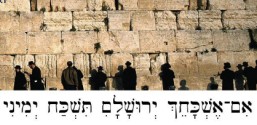
[ Yom Yerushalayim, or Jerusalem Day, is observed Saturday, June 4th (after sundown) through Sunday, June 5th (until sundown)... ]
05.30.16 (Iyyar 22, 5776) In Israel, "Jerusalem Day" (i.e., Yom Yerushalayim: יום ירושלים) commemorates the re-unification of old city of Jerusalem on June 7th, 1967 during the Six Day War. In 1968 the Chief Rabbinate of Israel declared Iyyar 28 to be a minor holiday to thank God for answering the 2,000-year-old prayer of "Next Year in Jerusalem." On March 23, 1998, the Knesset passed the Jerusalem Day Law, making it an annual national holiday. This year, Iyyar 28 runs from Saturday, June 4th (after sundown) through Sunday, June 5th (until sundown). Sha'alu shelom Yerushalayim (Psalm 122:6).
The Hebrew word "Zion" (צִיּוֹן) is mentioned over 160 times in the Scriptures. That's more than the words faith, hope, love, and countless other key words... And since Zion is a poetic form of the word Jerusalem (יְרוּשָׁלַםִ), the number of occurrences swells to nearly 1,000! Since it's the most frequently occurring place name in all the Scriptures, it's no overstatement to say that God Himself is a Zionist.... "Out of Zion, the perfection of beauty, God shines forth" (Psalm 50:2). "The LORD loves the gates of Zion more than all the dwellings of Jacob. Glorious things are said of you, O City of God" (Psalm 87:2-3). Indeed, Yeshua our Savior called Jerusalem the "City of the great King" (Psalm 48:2; Matt 5:35): It is the place (הַמָּקוֹם) where He was crucified, buried, resurrected, and ascended to heaven; and is it furthermore the place where He will return to earth (Zech. 14:1-9).
In Psalm 122:6 it is written, שַׁאֲלוּ שְׁלוֹם יְרוּשָׁלָםִ - sha'alu shelom Yerushalayim - "Pray for the peace of Jerusalem," a phrase that reveals prophetic truth about our Savior and Messiah. The word sha'alu (שַׁאֲלוּ) means "you ask" (as in ask a sheilah, a question), shalom (שׁלוֹם) is the name of Yeshua, the Prince of Peace (i.e., Sar Shalom: שַׂר־שָׁלוֹם), and Jerusalem means "the teaching of peace" (Jeru- comes from the same root as the word Torah [ירה], which means "teaching"). The phrase sha'alu shelom Yerushalayim can therefore be construed, "ask about the Prince of Peace and His Teaching." Yeshua is indeed the rightful King of Jerusalem (Matt. 5:35) who is coming soon to reign over all the earth.
שַׁאֲלוּ שְׁלוֹם יְרוּשָׁלָםִ
יִשְׁלָיוּ אהֲבָיִךְ
sha·a·lu · she·lom · ye·ru·sha·la·yim
yish·la·yu · o·ha·va·yikh

"Ask for the well-being of Jerusalem;
May those who love you be at peace" (Psalm 122:6).

Download Study Card
The Ascension of Messiah...

[ Wednesday, June 1st after sundown marks the 40th day of the Omer Count... ]
05.29.16 (Iyyar 21, 5776) We are in the midst of Sefirat Ha-Omer (the "Counting of the Omer"), a 49 day countdown that runs from Nisan 16 through Sivan 5. The first day of the omer count began on the second night of Passover, and the last day occurs the day before the great jubilee of Shavuot ("Pentecost"). On our Gregorian calendars, these dates run from April 23rd until June 10th this year. This is a "countdown period" leading to the giving of the Torah at Sinai and the giving of the Holy Spirit to Yeshua's disciples...
 |
Wednesday, June 1st after sundown (Iyyar 25) marks the 40th day of the Omer Count (i.e., Mem B'Omer), the time associated with the ascension of Yeshua back to the heavenly realm (Luke 24:44-53; Acts 1:9-11; Eph. 4:8). A thousand years before the birth of our Moshiah (מוֹשִׁיעַ), David prophesied of the ascension when he announced the Lord's enthronement at the right hand of God (Psalm 110:1; Matt. 22:41-46; 26:64). Recall that Yeshua told His followers that it was good that he would leave them, so that the Holy Spirit (רוּחַ הַקּדֶשׁ), the "Comforter" or "Advocate" (παράκλητος), would be given to them. "But I tell you the truth, it is for your advantage that I am going away. For if I do not go away, the Advocate (ὁ παράκλητος) will not come to you, but if I go, I will send him to you" (John 16:7). Notice that the word translated as "advantage" here is the Greek word συμφέρω (from σύν, "with" and φέρω, "to carry"), which suggests that we would be given power that "carries us" with the Lord during the trials of this life... Bo, Ruach Elohim: "Come, Holy Spirit..."
Note: For more on this, see "Mem B'Omer and the Ascension of Yeshua."
 |
Parashat Bechukotai - בְּחֻקּתַי

05.29.16 (Iyyar 21, 5776) Our Torah reading this week (parashat Bechukotai) begins with the promise that if the Israelites would walk in the LORD's statutes (chukkot) and commandments (mitzvot) and perform them, then they would enjoy material blessings and dwell securely in the promised land. Moreover the LORD Himself would make His dwelling with them and would walk among them as their God. The people of Israel would then truly be am segulah (עַם סְגֻלָּה) - a treasured people among all the nations of the earth.
On the other hand, if the people disobeyed God and disregarded His commandments, then they would be considered covenant-breakers, and they would experience all manner of distress and tribulation in their lives. They would experience panic attacks, diseases, heartache, and all manner of tsuris (vexation, trouble); their enemies would eat their increase, and those who hate them would rule over them; they would flee at the rustle of a leaf, and their lives would be full of terror and misery – all because they refused to put the LORD God first in their lives. And if after all this trouble the people would still refuse to return to the LORD, the worst punishment of all would befall them: exile from the promised land and banishment from the Presence of the LORD Himself.
Nonetheless, despite their disobedience, God's love and mercy for Israel would never fully depart, for "if they confess their iniquity and the iniquity of their fathers in their treachery that they committed against me, and also in walking contrary to me, so that I walked contrary to them and brought them into the land of their enemies – if then their uncircumcised heart is humbled and they make amends for their iniquity, then I will remember my covenant with Jacob, and I will remember my covenant with Isaac and my covenant with Abraham, and I will remember the land" (Lev. 26:40-42). Moreover, even while they are in exile, in the land of their enemies, God vowed: "I will not cast them away; nor will I ever abhor them to destroy them and to break My covenant with them; for I am the LORD their God" (Lev. 26:44).
The portion (and the Book of Leviticus) ends with a discussion of various laws pertaining to vows and tithes that a person may make to contribute towards the upkeep of the Sanctuary. These include dedications of persons, animals, houses, and lands. The scroll of Leviticus ends with the emphatic statement: "These are the commandments that the LORD commanded Moses for the people of Israel on Mount Sinai."
Personal Note: Please remember me (John) in your prayers, friends... I have had a fever now for about 2 weeks with other health concerns.... We are feeling oppressed on all sides; our ministry is suffering; money is lean; these are times of testing. Please pray for the endurance for us to continue. The Talmud says that when we pray for another who has the same need as ourselves, God assuredly answers our own heart need as well... Thank you all so much for standing with us, encouraging us, praying for us....
Lord of the Center...

05.27.16 (Iyyar 19, 5776) God's Name is "I-AM-with-you-always," Immanuel (עִמָּנוּ אֵל) - always in the midst of you, your heart, your Center... The LORD is named this way because he is never without his own, and we are who we are in relation to his presence in our lives. Yeshua is not simply the Lord of the past or the Lord of the future, but the Lord of this moment, this "here" and this "now." He is the same yesterday, today, and forever - the breath of life, our sustaining hope, the Shepherd of our souls... Whatever else may come of this day, this is the day that the LORD has made, and we can find peace in God's Presence.
זֶה־הַיּוֹם עָשָׂה יְהוָה
נָגִילָה וְנִשְׂמְחָה בוֹ
zeh · ha·yom · a·sah · Adonai
na·gi·lah · ve·nis·me·chah ·vo

"This is the day that the LORD has made;
let us rejoice and be glad in it."
(Psalm 118:24)
Come just as you are...

05.27.16 (Iyyar 19, 5776) Since God knows the number of hairs on our heads, he also knows those character defects that we do not see in ourselves... Nevertheless we must come to God "just as we are," since what we are is ultimately unknowable by us. This implies that we can't wait to turn to God until we have already confessed our sins, since we often do not know what they are. "Those who are well have no need of a physician, but those who are sick" (Mark 2:17), which means that we come in a state of unknowing blindness to find healing. We don't see so we can turn; we turn so we can see. Confession turns to see God's remedy for our sin, and true teshuvah must begin with hope, with the vision that the LORD is our Helper and the Healer of our souls.
אֶשָּׂא עֵינַי אֶל־הֶהָרִים מֵאַיִן יָבא עֶזְרִי
עֶזְרִי מֵעִם יְהוָה עשֵׂה שָׁמַיִם וָאָרֶץ
es·sa · ei·nai · el · he·ha·rim · me·a·yin · ya·vo · ez·ri
e·zri · me·im · Adonai · o·seh · sha·ma·yim · va·a·retz

"I lift up my eyes to the hills. From where does my help come?
My help comes from the LORD, the Maker of heaven and earth."
(Psalm 121:1-2)

Download Study Card
Just as King David prayed, שְׁגִיאוֹת מִי־יָבִין מִנִּסְתָּרוֹת נַקֵּנִי, "who can understand his errors; cleanse me from nistarot chata'ot, secret sins" (Psalm 19:12), so we likewise trust that God's remedy for our sin will heal even that which is hidden from our own awareness...
Keep pressing on by faith, trusting in God's protection and care for you.. Shabbat Shalom and love to you all. And please remember this ministry in your prayers, too! Thank you so much.
Shepherd in Darkness....
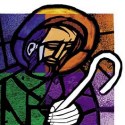
05.27.16 (Iyyar 19, 5776) "Yea, though I walk through the valley of the shadow of death, I will fear no evil..." (Psalm 23:4). O God of Light, Light of the world, surely You know my need for light as I look to You, especially when darkness tries to extinguish my hope. Despite my inability to see you now, help me to know that you are with me; let "thy rod and thy staff comfort me" and lead me closer to you. Lord, when I am afraid, quicken the faith you have put within my heart. Be Thou my Shepherd in my darkness, O Lord my God...
גַּם כִּי־אֵלֵךְ בְּגֵיא צַלְמָוֶת
לא־אִירָא רָע כִּי־אַתָּה עִמָּדִי
שִׁבְטְךָ וּמִשְׁעַנְתֶּךָ הֵמָּה יְנַחֲמֻנִי
gam · ki · e·lekh · be·gei · tzal·ma·vet
lo · i·ra · ra, · ki · at·tah · im·ma·di
shiv·te·kha · u·mish·an·te·kha · hem·mah · ye·na·cha·mu·ni

"Even though I walk through the valley of the shadow of death,
I will fear no evil, for You are with me;
Your rod and your staff, they comfort me"
(Psalm 23:4)

"Be not afraid." Over and over again in the Scriptures we hear the LORD saying to those who trust in Him, al-tirah, "be not afraid." Nachman of Breslov is reported to have once said, "All the earth is a very narrow bridge (כָּל־הָעוֹלָם כֻּלּוֹ גֶּשֶׁר צַר מְאד), and the point of life is never to be afraid." Likewise we trust Yeshua to be the Bridge to the Father, the narrow way of passage that leads to everlasting life. He calls out to us in the storms of this world, "Take heart. It is I; be not afraid" (Matt. 14:27). The heart of faith senses the LORD's presence, even in the darkness, and hears the Spirit saying, "I am with you..."
I do not see the road ahead of me, I cannot know for certain where it will end. Nor do I really know myself, and the fact that I think I am following your will does not mean I am actually doing so. But I believe the desire to please you does in fact please you, and I hope I have that desire in all that I am doing. I hope that I will never do anything apart from that desire. And I know that if I do this you will lead me by the right road, though I may know nothing about it. Therefore, I will trust you always, though I may seem to be lost and in the shadow of death. I will not fear, for your are ever with me, and you will never leave me to face my perils alone. - Thomas Merton
In times of testing, how we desperately do we need a sense of companionship and intimacy with the Lord! When you feel abandoned, ashamed, or alone; or when you are afraid and unsure of yourself; or when pain distances you from others, nudging you to isolation or loneliness, then may God's Spirit brood over you, whispering your name, reminding you that you are never alone, and that God Himself is forever for you, despite yourself. Therefore "fear no evil," because God is with you in the midst of your present darkness. As it is written: "Surely goodness and love shall pursue you all the days of your life, and you shall dwell in the house of the LORD forever" (Psalm 23:6). Come alive, O heart of faith!
Future and a Hope...

05.26.16 (Iyyar 18, 5776) Our Torah portion this week (i.e., Behar) includes the requirement that someone should redeem (buy) the land of their close relative if the relative is in such financial difficulty that he is forced to sell it: 'If your brother becomes impoverished and sells some of his property, then his near redeemer (גאֲלוֹ הַקָּרב) shall and redeem (גָאַל) what his brother has sold" (Lev. 25:25). In other words, if a man was forced to sell some of his inheritance due to poverty, then one of his close relatives had the duty to acquire it so that it would not pass into the hands of strangers. This law of redemption, as supplemented with the laws of inheritance (Num. 27:8-11), becomes a focal point in the Haftarah for Behar.
To contextualize the Haftarah reading (Jer. 32:6-27), the prophet Jeremiah was imprisoned in the guardhouse of the king's palace as the city of Jerusalem was under siege by the Babylonian armies (Jer. 32:2). King Zedekiah had decided to arrest the prophet and put him under armed guard to prevent him from spreading his terrifying message that Jerusalem would soon fall (Jer. 32:3).
While he was in prison, however, the LORD told Jeremiah that his cousin Hanamel would soon visit him and ask that he "redeem" his besieged land (Jer. 32:6-15). Even though Jeremiah understood that the exile of the people was imminent and that the Babylonians would soon take full possession of the land of Israel, he went ahead paid the price and signed the deed of sale in fulfillment of the law's requirement (Jer. 32:10). Before assembled witnesses Jeremiah instructed his secretary Baruch ben Neriah: "The LORD who rules over all (יהוה צְבָאוֹת), the God of Israel (אֱלהֵי יִשְׂרָאֵל) says, 'Take these documents, both the sealed copy of the deed of purchase and the unsealed copy. Put them in a clay jar so that they may be preserved for a long time to come. For the LORD God who rules over all, the God of Israel, says, "Houses, fields, and vineyards will again be bought in this land" (Jer. 32:14-16). Jeremiah looked ahead by faith and bought his cousin's land, even though the Babylonian invaders were on the verge of destroying the country and taking the people away in exile... His purchase of a seemingly worthless piece of land was symbolic of his complete assurance that one day God would regather the Jewish back in the land promised to the patriarchs.
After the property deal was completed in front of the assembled witnesses, Jeremiah offered a prayer to God, perhaps as a way to impart the significance of the seemingly preposterous transaction (Jer. 32:17-25). Some have suggested that Jeremiah's prayer was intended to function as a type of "sermon." At any rate, God responded to the prayer in two parts. On the one hand, the judgment upon the people of Judah was entirely just and inevitable (Jer. 32:18-36), but on the other hand, God promised to regather the people from "all the countries" (מכָּל־הָאֲרָצוֹת) of their exile and bring them back to the Promised Land (Jer. 32:37-44). Notice that this promise clearly extends beyond the 70 year Babylonian captivity, since it refers to exile to various different countries (Deut. 30:3; Jer. 32:37). Moreover, at the end of this great (i.e., worldwide) exile, the LORD would give them a new heart and a new will that would revere the LORD forever: "I will make with them an everlasting covenant (בְּרִית עוֹלָם), that I will not turn away from doing good to them. And I will put the fear of me in their hearts, that they may not turn from me. I will rejoice in doing them good, and I will plant them in this land in faithfulness bekhol libbi uvkhol nafshi (בְּכָל־לִבִּי וּבְכָל־נַפְשִׁי) - "with all my heart and all my soul" (Jer. 32:40-41). Just as God was sure to bring his judgment on the Jewish people, so he promised to bring them good at the end of days... "For I will restore them to their land. I, the LORD, declare it!"
As this prophecy shows, nothing is too wonderful for God (Jer. 32:27). God's wonder is that He alone is LORD of all people, and his power is unlimited.... As the prophet Isaiah said, the LORD is Pele Yo'etz (פֶּלֶא יוֹעֵץ), the Counselor of Wonders (Isa. 9:5): "O LORD, you are my God; I will exalt you; I will praise your name, for you have done wonderful things, plans formed of old, faithful and sure" (Isa. 25:1). The history of the world reflects God's overarching will, and therefore we need not fear the rise and fall of transient civilizations. God is on the throne, and ein od milvado (אֵין עוֹד מִלְבַדּו): "there is no power apart from Him" (Deut. 4:35,9; 1 Kings 8:60). God "works all things together for good" (πάντα συνεργεῖ εἰς ἀγαθόν) for those who are trusting in Him (Rom. 8:28).
כִּי אָנכִי יָדַעְתִּי אֶת־הַמַּחֲשָׁבת
אֲשֶׁר אָנכִי חשֵׁב עֲלֵיכֶם נְאֻם־יְהוָה
מַחְשְׁבוֹת שָׁלוֹם וְלא לְרָעָה
לָתֵת לָכֶם אַחֲרִית וְתִקְוָה
ki · a·no·khi · ya·da·ti · et · ha·ma·cha·sha·vot
a·sher · a·no·khi · cho·shev · a·lei·khem · ne·um · Adonai
mach·she·vot · sha·lom · ve·lo · le·ra·ah
la·teit · la·khem · a·cha·rit · ve·tik·vah

"For I know the thoughts I have for you, declares the LORD,
thoughts for healing and not for evil, to give you a future and a hope."
(Jer. 29:11)

Hebrew Study Card
Israel's Independence Day - Yom Ha'atzma'ut - is a phrase that comes from the Hebrew word for "bones" (i.e., atzmot: עצמות). The rebirth of the modern state of Israel in 1948 therefore reminds us of God's promise to revive the "dry bones" of Israel by bringing the Jewish people back from their long exile (Ezek. 37:4-6). Of course, the spiritual rebirth of Israel is yet to come and will not occur until the prophesied End of Days, but Israel first must be within the land for the words of the prophet to be fulfilled, "Prophesy over these bones (הִנָּבֵא עַל־הָעֲצָמוֹת) - and say to them, "O dry bones, hear the word of the LORD."
Starting Point of Justice...

[ The following is related to our Torah reading for this week, Parashat Behar.... ]
05.25.16 (Iyyar 17, 5776) From our Torah portion this week (i.e., parashat Behar) we read: "you shall not oppress one another" (Lev. 25:14). The prohibition not to defraud or "vex" others means, first of all, not to deceive yourself... As it says elsewhere in the Holy Scriptures: אֱמֶת קְנֵה וְאַל־תִּמְכּר - "Buy truth and do not sell it" (Prov. 23:23), which teaches us to hold some things as non-negotiable and not subject to compromise. Honesty with yourself is the starting point of all social justice...
Truth and Freedom...
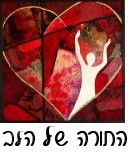
05.25.16 (Iyyar 17, 5776) "You shall know the truth and the truth shall make you free" (John 8:32). Spiritually understood the soul in its natural state is sick, in a state of error and ongoing self-deception. The truth sets us free from our self-imprisonment, from the bondage we have to our illusions, so that we may be healed, transformed and made new. However, knowing the truth is more volitional than it is cognitive – it is revealed in our decisions and actions, not merely in holding to a "true opinion" or assenting to a "true creed." Knowing the truth permeates the whole person – bekhol levavkha – and accepts all the consequences of its decision and passion. There is danger here, friends. Even learning Scripture and studying theology may become untruth if it is devoid of the fear of the Lord. "How many have asked, 'What is truth?' and at bottom hoped that it would be a long time before the truth would come so close to him that in the same instant it would determine what his duty was to do at the moment?" (Kierkegaard: Works of Love).
The deeper question is whether you actually want genuine freedom, since many are content to "exist" in the cold comfort of their resentments, in the desert of the self-serving ego, and in the wastelands of angers and fears... Self-deception is enticing because it provides an excuse to be mediocre; it justifies the victim mentality and abnegates personal responsibility. It is far easier to blame others for your life than to own the truth about yourself, to walk in the truth, and to seek the blessing of truth. As Kierkegaard also wrote: "One has in one's innermost being a secret anxiety about and wariness of the truth, a fear of getting to know too much. Or do you actually believe that it is everyone's honest desire to get to know very effectively what self-denial is, to get it made so clear that every excuse, every evasion, every extenuation, is cut off from appeal?" True freedom means being awakened and empowered to choose the Eternal by denying the present moment's demand to be made absolute. It offers no peace to the natural desire for the soul to return to its soporific state, but calls and rouses the heart to wake up and confront the demands of eternity...
 |
Bread from Heaven...
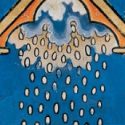
[ The following is related to our Torah reading for this week, Parashat Behar.... ]
05.25.16 (Iyyar 17, 5776) It is remarkable that the commandment of "shemittah" (שמיטה) – that is, the responsibility to let the land lie fallow for an entire year every seven years – was introduced with the statement that God gave this law "behar Sinai" (בּהר סיני) – on the mountain of Sinai (see Lev. 25:1-7). This is remarkable for a variety of reasons, first because the people had no idea of the farming conditions of the promised land as they wandered in the desert, but also because the commandment to leave the land fallow every seventh year was given with the stern warning that the failure to do so would result in judgment and exile from the land (Lev. 26:24-35; Jer. 29:10; 2 Chron. 36:21). In this connection the sages taught that the Torah could only have been given to the generation that partook of the manna – only to those who understood that their survival depended entirely on God's gracious provision (Deut. 8:3). Likewise, every seven years the shemittah would reinforce the lesson of the manna, namely, that man's efforts do not give sustenance, but God alone gives and sustains life. As Yeshua attested: "Man does not live by bread alone, but by every word that comes from the mouth of God" (Matt. 4:4).
The shemittah teaches us to let go of our devices, to forsake our "need" to control, and to completely trust in God's care for our lives... That is its spiritual application. Indeed the word "shemittah" (שמיטה) means "release" (i.e., שָׁמַט, to "let drop") which suggests letting go of the past, forgiving, restoring, and allowing ourselves to be carried, sustained, and brought forward by faith. The LORD promises us an "extra portion" of manna to sustain us when we honor his request that we get out of the way, when we let go of our devices and let things be, trusting our heavenly Father to take care of things...
 |
Eschatology and Shavuot...

[ The following is related to the holiday of Shavuot, which begins June 11th this year... ]
05.24.16 (Iyyar 16, 5776) Some people believe that the ultimate fulfillment of the holiday of Shavuot (i.e., "Weeks" or "Pentecost") is found in the mysterious catching away (ἁρπάζω, harpazo) of believers before the time of the "Great Tribulation" and the Great Day of the LORD (1 Thess. 4:17; John 14:3; 1 Cor. 15:51-52). They reason that since Shavuot marked the day of dramatic revelation, with signs of fire and the sounds of a heavenly shofar blast, an appointed time that marks the jubilee fulfillment of Passover, it can therefore be seen as the rapturous end of redemption for those who believe, symbolic of a wedding day, when God betrothed Israel as His own people, separate from all others. Both Jew and Gentile will be "waved" before the LORD (as symbolized by shtei ha-lechem, the two loaves), representing the "one new man" of kallat Mashiach, the "bride of Messiah," or the assembly of those called out from every tribe and tongue to be a part of God's heavenly kingdom.
 |
Though no one knows the day or hour of the return of Yeshua our Messiah (see Matt. 24:36; Acts 1:7), there are clues given in Scripture about the conditions of the world before His return, and Yeshua himself gave us parables admonishing us to actively be looking (Matt. 24:2-14; 25:1-13). The Apostle Paul said that followers of the Lord can know the "season" of Messiah's return, and warned that He will come "as a thief in the night" - not in the revelation of great power and glory at the end of the age (1 Thess. 5:2-6). Moreover, Paul forewarned of the rise of worldwide godlessness (2 Tim. 3:1-7) and even of the flagrant apostasy of the "institutionalized" church (1 Tim. 4:1-3), which is of course evident today... Other Scriptures foretell of the coming One World Government, the rise of the Messiah of evil (Antichrist) whose "god" will be the "security state" (Dan. 11:38), the persecution of the national Israel (a nation miraculously restored to the promised land), the rebuilding of the Temple, the coming Great Tribulation, and so on. "When these things begin to take place, straighten up and lift up your heads, because your redemption is drawing near" (Luke 21:28).
Regarding the "world system," however, we have quite a different vision... The LORD God Almighty has vowed to break the pride of the "kings of the earth" with a rod of iron and dash them in pieces like a potter's vessel, and the shattering will be so ruthless that among its fragments not a shard will be found with which to take fire from the hearth, or to dip up water out of the cistern (Psalm 2:9; Isa. 30:14). For from His mouth comes a sharp sword with which to strike down the nations, and He will rule them with a rod of iron. He will tread the winepress of the fury of the wrath of God the Almighty (Rev. 19:15). Nebuchadnezzar's great dream will soon be fulfilled: "As you looked, a Stone was cut out by no human hand, and it struck the image on its feet of iron and clay, breaking them in pieces. Then the iron, the clay, the bronze, the silver, and the gold, all together were broken in pieces, and became like the chaff of the summer threshing floors; and the wind carried them away, so that not a trace of them could be found. But the stone that struck the image became a great mountain and filled the whole earth" (Dan. 2:34-35). "And the God of heaven will set up a kingdom that shall never be destroyed ... and it shall stand forever" (Dan. 2:44). One day the edifice of man's godless pride will come crashing down, and there will be no trace left of its rubble... Amen; even so, come quickly, Lord!
Note: Our tradition does not require us to accept everything at face value, though it does expect us to study, to wrestle, to seek truth. Each of us must "go to Peniel" to wrestle with the Angel; each of us must be renamed from Ya'akov ("a supplanter") to Israel ("a prince with God"). When the Spirit of Truth asks, "What is your name," may the LORD God grant you the courage to refuse to "let go" until you receive the divine blessing of love and acceptance.
 |
Strange Settlers...
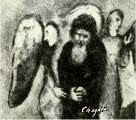
[ The following is related to our Torah reading for this week, Parashat Behar.... ]
05.24.16 (Iyyar 16, 5776) Our Torah portion this week (i.e., parashat Behar) includes two laws that were intended to radically affect the social, economic, and spiritual well-being of Jews in ancient Israel. Regarding the laws of the sabbatical year (shemittah) and the Jubilee (yovel), the LORD states: "The land shall not be sold in perpetuity, for the land is mine, for you are strangers (גֵּרִים) and settlers (תּוֹשָׁבִים) with me" (Lev. 25:23). This is a paradoxical phrase, since a ger is one who is just passing through, like a visitor or tourist, whereas a toshav is one who is a resident, like a settler or citizen. But how can someone be both a visitor and a resident of a place, or a stranger and a citizen at the same time? How can one "pass through" a place he is said to dwell?
Concerning this paradox the Maggid of Dubna comments: "If you see yourselves in this world as strangers and remember that you are here only for a short visit, passing through the hallway of this world, then I will settle among you. However, should you see yourselves as settlers on this world, "owners" who are here to stay, then I am but a stranger among you. Either you are the settlers and I the stranger, or you the stranger and I the settler."
In other words, God "settles" among those who are exiles in this world... Those who "settle" here, who lay claim to this world, therefore make God their stranger. As James the Righteous warned, "Do you not know that friendship with the world is enmity with God? Therefore whoever wishes to be a friend of the world makes himself an enemy of God" (James 4:4). Likewise the Apostle John admonished: "Do not love the world or the things in the world. If anyone loves the world, the love of the Father is not in him... For the world is passing away along with its lusts, but whoever does the will of God shall abide forever" (1 John 2:15,17). Those who walk in faith invariably regard themselves as gerim v'toshavim (גֵּרִים וְתוֹשָׁבִים) - "strangers and exiles" upon the earth (Heb. 11:13).
Note: For more on this see "Strange Settlers: Further thoughts on parashat Behar."
 |
Bones of Reality...

05.23.16 (Iyyar 15, 5776) From our Torah this week (Behar) we read: "For you are strangers and sojourners (גֵרִים וְתוֹשָׁבִים) with me" (Lev. 25:23). When we are strangers to this world, we reside with God: we are called residents of heaven. To be a stranger to this world is a great blessing, since it means we identify our home in the heart of God. By extension, reality is measured by proximity to the Eternal, and the material world - when regarded as an end in itself - is nothing but an illusion, since it cannot exist apart from the sustaining power of God (Heb. 1:3; Col. 1:16-17; Rev. 4:11). The sages note that in Hebrew there is no language of categorical ownership, since all things are conditioned by time. We say yesh li (יש לי) - "there is to me" (for this time) rather than "I have" or own. Ownership is related to the "bone" (עֶצֶם) of something, its inner structure and essence. God alone is koneh shamayim va'aretz (קנֵה שָׁמַיִם וָאָרֶץ), the Owner of Reality (Gen. 14:9). "For from him and through him and to him are all things. To him be glory forever. Amen" (Rom. 11:36).
לְךָ יָאֶה אֲדנֵינוּ וֵאלהֵינוּ
לְקַבֵּל אֶת הַכָּבוֹד וְהַיְקָר וְהַגְּבוּרָה
כִּי אתָּא בָּרָאתָ הַכּל
וּבִרְצוֹנְךָ הָיוּ וְנִבְרְאוֹ
le·kha · ya·eh · a·do·nei·nu · ve·lo·hei·nu
le·ka·bel · et · hak-ka·vod · ve'ha-ye·kar · ve'ha-ge·vu·rah
ki · at·tah · ba·ra·ta · ha-kol
u·vir·tzon·kha · hai·yu · ve'niv·re·u

"You are worthy, O Lord and our God,
to receive the glory and the honor and the power:
for You have created all things,
and for thy pleasure they are and were created."
(Rev. 4:11)

Hebrew Study Card
Shekhinah of Humility...
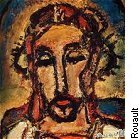
[ The following is related to our Torah reading for this week, parashat Behar... ]
05.23.16 (Iyyar 15, 5776) Why is it, the sages asked, that God bypassed all of the world's great and lofty mountains and chose to give the Torah behar Sinai - on the humble mountain of Sinai? Because God's Spirit (רוּחַ) rests with the lowly, the humble of heart. Therefore humility (עֲנָוָה) is considered one of the greatest of middot ha-lev (heart qualities). "For this is what the high and exalted one says, the one who rules forever, whose Name is Holy: "I dwell in an exalted and holy place, but also with the crushed and lowly of spirit, to revive the spirit of the lowly and to revive the heart of the crushed" (Isa. 57:15).
כִּי כה אָמַר רָם וְנִשָּׂא שׁכֵן עַד וְקָדוֹשׁ שְׁמוֹ
מָרוֹם וְקָדוֹשׁ אֶשְׁכּוֹן וְאֶת־דַּכָּא וּשְׁפַל־רוּחַ
לְהַחֲיוֹת רוּחַ שְׁפָלִים וּלְהַחֲיוֹת לֵב נִדְכָּאִים
kee · kho · a·mar · rahm · ve·nee·sa · sho·khen · ad · ve·ka·dohsh · she·moh
ma·rohm · ve·ka·dohsh · esh·kohn · ve·et · dak·ka - oosh·fahl · roo'·ach
le·ha·cha·yoht · roo'·ach · she·fa·leem · oo·le·ha·cha·yoht · lev · need·ka·eem

"For this is what the high and lifted up One says, the One who abides forever,
whose Name is Holy: "I dwell in a high and holy place, but also with the broken
and lowly of spirit, to revive the spirit of the lowly and to revive the heart of the crushed."

Download Study Card
God reveals Himself to the "lowly in spirit" (שְׁפַל־רוּחַ), that is, to those who understand their own nothingness and complete dependence on Him.... Notice that the word dakka (דַּכָּא) refers to being crushed to the very dust, the very same word used to describe how Yeshua was crushed for our iniquities (Isa. 53:10). William James called this deep work of the spiritual life Zerrissenheit, a term that can be translated as "torn-to-pieces-hood," or a state of being utterly broken and in disarray... From the point of view of our dependence on God for salvation, dakka refers to humility and contrition we express in light of God's unmerited favor and love for our souls... We identify with the death of Messiah offered on our behalf; we find healing and acceptance in the Presence of the One who was torn to pieces and made dust for our merit. Humility is essential to awareness of God in the truth.
Note: Suffering is ultimately a mystery... Some people experience a deeper sort of breaking, for reasons we cannot fathom, though all people who come to the Lord will experience breaking, an abandonment of self-reliance, and a yearning for deliverance. As Yeshua said of our relationship to the Rock of God's Salvation: "Anyone who falls on this stone will be broken to pieces; anyone on whom it falls will be crushed to the dust" (Matt. 21:44).
 |
The "Jubilee" Year...

05.22.16 (Iyyar 14, 5776) Our Torah portion this week (parashat Behar) begins with the commandment that an Israelite farmer must let his land remain fallow every seventh year. This is called the "Sabbatical year" (i.e., shemittah: שמיטה), and the inhabitants of the land were permitted to glean whatever the farmland produced naturally. In addition, the people were told to count seven cycles of seven years – a total of 49 years – and to mark the arrival of the fiftieth year with blasts of the shofar on the Day of Atonement (Yom Kippur). This fiftieth year would be a time of "Jubilee" (i.e., yovel: יוֹבֵל) – a year of "release" for the land and all its inhabitants. All slaves would be set free, debts would be canceled, and the stewardship of the land would revert to its original titleholders.
In this connection, how might you determine whether a given year is a Sabbatical year (i.e., shemittah)? We take the current Jewish year and divide by seven; if there is no remainder, it is a shemittah year; otherwise it is not. For example year 5775 is a Sabbatical Year, whereas year 5776 is not (note that the Jewish year begins on Rosh Hashanah, on Tishri 1, in the fall). The Jubilee year (yovel) of course follows the seventh of the seven year cycles (i.e., 7 x 7 + 1), though there are some questions about which iteration (1st, 2nd, ... 7th) is currently active. According to some authorities, the last Jubilee year was in 5727, which means the next would be Yom Kippur 5776, that is, Tues. Oct. 11th, 2016...
Shavuah tov, friends... Please keep me in your prayers, as I've been feverish and covered with body aches for the last week now... Thank you so much.
Substance of Hope...

05.20.16 (Iyyar 12, 5776) There are moments – dark, gnawing, raw – when you may lose sight of hope, when you might even fear that you have lost your faith – not in God or his promises – but rather in yourself, in your own strength to continue, to stay focused, to keep pressing on "hope against hope..." The remedy here is always the same: to remember that within you – that is, in your flesh - "there is no good thing" and that the miracle of salvation is made secure by God's passion for you, not your own power or desire. "Not by might, nor by power, but by my Spirit, saith the LORD of Hosts." We don't trust in ourselves nor in the strength of our inner resolve, but solely in the power of God to make the way. We must turn away from ourselves to regain the message of God's unfailing love; only when we lose sight of ourselves do we find ourselves. God redeems you from your lost estate and touches you in your uncleanness; He clothes himself in your pain so that you may be clothed in his love. That never changes, despite dark moments, and to that we must always return...
Where it says, "I can do all things through Messiah who strengthens me" (Phil 4:13), that includes being healed of the inner pain of rejection, abandonment, and even abuse suffered from childhood. It means being set free from disillusionment, despair, and the oppression of relentless fear. "I can do all things through Messiah" means no longer accepting messages of self-hatred, no longer heeding the malicious whispers that say: "I am of no value," "I am unlovable," "my life is hopeless." No, "I can do all things through Messiah" means learning to be accepted, honored, and esteemed by God; it means opening your heart to God's love and blessing for your life; it means allowing your heart to be made right, to rest and enjoy inner peace... After all, Yeshua's great prayer was that we would know the truth of God's love for us (John 17), and this is the central need our lives...
 |
Hallowed be Thy Name...

[ The following is related to our Torah reading for this week, Parashat Emor.... ]
05.20.16 (Iyyar 12, 5776) There may come a severe test of your faith, when it would be better to give up your life than to deny God's will, since God's truth is so valuable that to repudiate it would be worse than death itself... A verse from our Torah portion reads: "You shall not profane my holy name, that I may be made sacred among the people of Israel" (Lev. 22:32), which the early sages said provides the basis for "kiddush HaShem" (קִדּוּשׁ הַשֵּׁם), a phrase that means honoring God's truth even if that might require giving up your life to do so. (On the other hand, denying God's truth is "chillul HaShem," a phrase that means disregarding God's authority over our lives.) Sanctifying God's name means we regard our relationship to God to be an end in itself - our ultimate concern - and there is therefore nothing higher that may challenge our duty before heaven. "Seek first the kingdom of God and his righteousness" (Matt. 6:33). Indeed our mortal life in this fleeting world is a means to the end of reaching our eternal destiny, and esteeming the means above the end is therefore idolatry. In other words, we exist only because of God, and when we live according to God's truth, we take a firm stand against corrupt culture by denying its its godless ideology, its benighted value system, its phony relativism, its arrogant skepticism, and so on. Our faith leads us into collision with the world and its power structures: "We ought to obey God rather than men" (Acts 5:29). Taking a stand for transcendental truth will make you an outsider to the "crowd" and its endless idols and vanities. Indeed a person of genuine moral conviction may be labeled an "enemy of the state," may be persecuted as a "terrorist," and may even suffer martyrdom. Shadrach, Meshach, and Abednego rightfully defied the king's decree to bow down before the "golden image," and they confessed that they were willing to die rather than betray the truth of the LORD of Israel (see Dan 3). This is a prime example of kiddush HaShem, of honoring the truth of God even at the risk of losing our lives. For many Jews, reciting the Shema is a solemn declaration that we esteem the truth of God above all things, that God alone is our ultimate good, and that we must be willing to surrender our lives rather than to deny the greatness and glory of His Name.
כִּי־טוֹב חַסְדְּךָ מֵחַיִּים
שְׂפָתַי יְשַׁבְּחוּנְךָ
ki · tov · chas·de·kha · me'chai·yim
se·fa·tai · ye·sha·be·chun·kha

"Because your lovingkindness is better than life,
my lips will praise you."
(Psalm 63:3)

Hebrew Study Card
Kiddush HaShem may be understand both literally and metaphorically. Literally understood, kiddush HaShem (i.e., martyrdom) is a possibility, one of the severest tests that may be given to the soul, and the temptation is to shrink back from the threat of death by denying the faith... Metaphorically understood, kiddush HaShem is a necessity, an essential act of the will that decides to "take up the cross" and follow Yeshua, and the temptation is to minimize the truth, to compromise the faith, and to slowly fade away... Yeshua asks, "What will it profit a person if he gains the whole world and forfeits his soul?" (Mark 8:36). Indeed, finding your life, value, and "place" here is to exile yourself from the promise of heaven. As Yeshua said, "Whoever finds his life will lose it, and whoever loses his life for my sake will find it" (Matt. 10:39). What is required, in other words, is categorically everything, with nothing left over...
We see an example of both chillul HaShem and kiddush HaShem in the life of the Apostle Peter. On the one hand, though he had boldly professed that he would be willing to die for Yeshua, he later denied that he even knew his Savior and friend (Luke 22:33-34)... After his teshuvah (i.e., repentance) however, Peter became wholehearted and fearless, and Christian tradition says he eventually died as a martyr under the tyranny of the Roman Emperor Nero... Likewise, in our effort to relate to people of different faith, we may be tempted to soften the demands of the gospel or to minimize the deity of Messiah. Sadly I've seen this happen a lot among Gentiles who get so enamored with the Jewish roots of the Christian faith that they begin to question, then outright deny the central Torah of our Messiah. We do not confuse the covenants of God, for this leads to double-mindedness and is regarded as spiritual adultery (see Rom. 7:1-4). It is chillul HaShem - the desecration of the Name above all Names - to turn away from the meaning and message of the cross of Messiah (Gal. 6:14; 1 Cor. 2:2). The price of being loyal to Messiah is mesirut nefesh (מְסִירוּת נֶפֶשׁ) -- surrendering your life by "taking up the cross." The cross is a scandal to religion and all other attempts to whitewash the truth about the human condition (Gal. 5:11).
 |
Appearance and Reality...
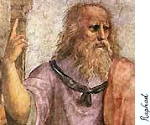
05.19.16 (Iyyar 11, 5776) The Hebrew word for "world" or "age" is olam (עוֹלָם), which is derived from a root verb (עָלַם) that means "to conceal" or "to hide." God "hides" His face from us so that we will seek Him, and that means we must press through ambiguity to earnestly take hold of divine truth. Long before the time of the philosopher Plato, King David proclaimed that there was a "divided line" between the realm of the temporal world and realm of the hidden and eternal world. The temporal world is finite, subject to change, yet pointed beyond itself to an eternal world, which was the source of real significance, meaning, and life itself (2 Cor. 4:18). Therefore King David said, בַּקְּשׁוּ פָנָיו תָּמִיד/ bakeshu fanav tamid: "Seek His face continually" (Psalm 105:4). Note that the numerical value for the word "fanav" (i.e., "His face") is the same as that for the word "olam." When we truly seek God's face (i.e., His Presence) we are able to discern the underlying purpose for our lives.
דִּרְשׁוּ יְהוָה וְעֻזּוֹ
בַּקְּשׁוּ פָנָיו תָּמִיד
dir·shu · Adonai · ve·u·zo
ba·ke·shu · fa·nav · ta·mid

"Seek the LORD and his strength;
seek his presence continually."
(Psalm 105:4)
ζητήσατε τὸν κύριον καὶ κραταιώθητε
ζητήσατε τὸ πρόσωπον αὐτοῦ διὰ παντός

Note that the ancient Greek translation of the Hebrew Torah (i.e., the Septuagint) renders this verse as, "Seek the LORD and be strengthened; seek His face through everything (διὰ παντός)." Unlike Plato, however, who "saw through" the temporal world and regarded it as less than real, King David understood that how we live within the intersection of these two realms revealed our inner character of faith -- and therefore our ultimate destiny....
Shelter through the changes...
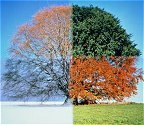
[ The following is related to our Torah reading for this week, Parashat Emor.... ]
05.19.16 (Iyyar 11, 5776) Our Torah portion for this week (Emor) lists the yearly cycle of Sabbaths and festivals for the people of God (see Lev. 23). The sages say that of all the festivals listed, however, the festival of Sukkot (i.e., "Tabernacles") is associated with joy: "On the fifteenth day of the seventh month, when you have gathered in the produce of the land, you shall celebrate the feast of the LORD (חַג־יְהוָה) seven days... and you shall rejoice before the LORD your God" (Lev. 23:39-40). Likewise it is written of Sukkot: "You shall rejoice in your feast... you will be altogether joyful" (Deut. 16:13-15). The festival of Sukkot is associated with joy not only because it celebrates the harvest at the end of the year, but because it celebrates God's care for our lives as we sojourn through this world, and ultimately, celebrates our salvation in the world to come (Zech. 14:16; Isa. 33:20; Ezek 37:27; Rev. 21:3). In this life the sukkah represents our temporary dwelling as we walk through the flux, shadows, and decay of this world, and therefore it symbolizes our mortality, and yet we are to regard the festival as z'man simchateinu (זְמַן שִׂמְחָתֵנוּ), the "season of our joy." We joyfully cry out, "L'Chayim! To Life," as we reflect on the days and seasons that have passed, and especially about the great homecoming we have in the world to come.
The festival of Sukkot teaches us not to deny death, but to rejoice in God's ongoing care for our lives. "For this light momentary affliction is preparing for us an eternal weight of glory beyond all comparison, as we look not to the things that are seen but to the things that are unseen. For the things that are seen are transient, but the things that are unseen are eternal. For we know that if the tent that is our earthly home is destroyed, we have a building from God, a house not made with hands, eternal in the heavens" (2 Cor. 4:17-5:1).
 |
Mercy's Like-for-Like...

[ The following is related to our Torah reading for this week, Parashat Emor.... ]
05.19.16 (Iyyar 11, 5776) In our Torah portion this week we read, "whatever injury he has given a person shall be given to him" (Lev. 24:20). Some of the sages comment that this is not so much about "eye for eye, tooth for tooth" retributive justice as it is about reciprocity of the will. As you see others, so you will see yourself; as you cause a defect in another, so it will be given to you. Therefore the Baal Shem Tov observed, "Other people are like mirrors: the faults we see in others our own." Indeed Yeshua taught us: "condemn not and you will not be condemned; release, and you will be released" (Luke 6:37). As we forgive others, so we find our own forgiveness. "Love covers a multitude of sins" (Prov. 10:12).
Seeking the Given...

05.18.16 (Iyyar 10, 5776) "Where shall I go from your Spirit? Or where shall I flee from your presence? If I ascend to heaven, you are there! If I make my bed in hell, you are there" (Psalm 139:7-8). Since the LORD is everywhere present, we do not seek for Him beyond our hearts, though we must turn so that we can realize the place where the Divine Presence is.... Therefore "seek the LORD and his strength; seek his presence continually" (Psalm 105:4). Why do we need to seek, though, if God's Presence fills the heavens and the earth? We must seek God because His presence is often hidden from us. "I will hide my face... because you have turned..." (Deut. 31:17-18). Put another way, the "hiding of God's face" comes from our own hiding from God. When we turn to God in confession, however, we discover the truth that God is everywhere present, right in the center of our very heart...
From the Torah we read, "But you shall seek the place (הַמָּקוֹם) that the LORD your God will choose ... there you shall go" (Deut. 12:5). If you love God and God loves you, what need do you have of the world to come, of rewards, accolades, recognition, and so on? The love of God is all you need, and whatever else heaven might mean is surely found in that. If we do not live today - now - are we really living? As it is said, "For he is our God, and we are the people of his pasture, and the sheep of his hand, today - if we hear his voice" (Psalm 95:7).
 |
True and False Worship...

05.18.16 (Iyyar 10, 5776) Asks the Savior: "Why do you call me 'Lord, Lord,' and not do what I tell you?" (Luke 6:46). Regarding this question Kierkegaard comments: "True worship quite simply consists in doing God's will. But that kind of worship was never to people's liking. What occupies people in every age is to arrange another kind of worship that consists of doing their own will, but in such a way that God's name, calling upon God, is connected with it, whereby people think themselves protected against being ungodly – alas, although precisely this is the most definite kind of ungodliness" (The Moment: 1854). It is easy to go wrong here. The will of God is forever to trust in his Son, and indeed, this is the "work of God" (John 6:28-29). Yet this means suffering for God, needing him, yearning for his daily blessing, being abandoned to his care for your life... When out of the depth of our need – without pretense and in despair over ourselves – we cry out to the LORD, he will surely help us. As it is written: "If we ask according to his will, he hears us" (1 John 5:14), and therefore it is the heart's need for Him that is the will of God...
"Not everyone who says to me, 'Lord, Lord,' will enter the kingdom of heaven, but the one who does the will of my Father who is in heaven. On that day many will say to me, 'Lord, Lord, did we not prophesy in your name, and cast out demons in your name, and do many mighty works in your name?' And then will I declare to them, 'I never knew you; depart from me, you workers of lawlessness'" (Matt. 7:21-23). Despite the profession and practice of their faith, these people were strangers to God... They had a false sense of assurance, believing that they were "serving God" while they really were not... Therefore the essential question here is whether Yeshua truly knows you and the need of your heart. You may know a lot about God, religion, spirituality, and yet you may remain unknown by him... Where do you find life? What are you loving? Where are you going?
"On that day many will say to me, 'Lord, Lord, did we not ... do many mighty works in your name?' And then will I declare to them, 'I never knew you" (Matt. 7:22-23). From this we understand that good works - even those done in the name of Messiah - are insufficient for life, and that something more is needed... That "something more" is the reality of relationship with him. However, even Yeshua's sacrifice on the cross can't bring you into relationship with him apart from personally receiving it for your healing... By faith you encounter Yeshua clothed in your flesh, your sin, and suffering death for you. "As long as Christ remains outside of us we are separated from him."
 |
Torah of Brokenness...

05.17.16 (Iyyar 9, 5776) It was only after Moses experienced brokenness and confession (prefigured by the shattering of the first set of tablets and the 40 days of teshuvah) that the inner meaning of God's Name was revealed as "mercy, grace, longsuffering, faithfulness, compassion," and so on (Exod. 34:6-7). The passion of Moses prefigures the inner breaking necessary before the law of God can be "written upon the heart." As it is written of the New Covenant, "I will put my law within them, and I will write it on their hearts" (Jer. 31:33).
הָרפֵא לִשְׁבוּרֵי לֵב
וּמְחַבֵּשׁ לְעַצְּבוֹתָם
ha-ro·fei · lish·vu·rei ·lev
u'me·cha·besh · le'atz·tze·vo·tam

"He is the healer of the brokenhearted
and the One who binds up their sorrows."
(Psalm 147:3)

Download Study Card
Patience and Healing...

05.17.16 (Iyyar 9, 5776) "Should pain and suffering, sorrow, and grief, rise up like clouds and overshadow for a time the Sun of Righteousness and hide Him from your view, do not be dismayed, for in the end this cloud of woe will descend in showers of blessing on your head, and the Sun of Righteousness rise upon you to set no more for ever" (Sadhu Singh). The Sun of Righteousness (שֶׁמֶשׁ צְדָקָה) does forever shine, even in the dark hours. "Heal me, O LORD, and I shall be healed; save me, and I shall be saved, for you are my praise."
רְפָאֵנִי יְהוָה וְאֵרָפֵא
הוֹשִׁיעֵנִי וְאִוָּשֵׁעָה כִּי תְהִלָּתִי אָתָּה
re·fa·ei·ni · Adonai · ve·ei·ra·fei
ho·shi·ei·ni · ve·iv·va·shei·ah, · ki · te·hil·la·ti · at·tah

"Heal me, O LORD, and I shall be healed;
save me, and I shall be saved, for you are my praise."
(Jer. 17:14)

Download Study Card
Personal Note: I have not slept much for several days on account of ongoing pain issues. Today I am running a fever and feel very tired doing the simplest of things. Please pray that I am strengthened to continue serving here. Thank you so much, friends...
You always Speak Twice...
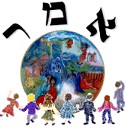
[ The following is related to our Torah reading for this week, Parashat Emor.... ]
05.16.16 (Iyyar 8, 5776) Our Torah portion this week begins, "And the LORD said to Moses, "Speak (אמר) to the priests, the sons of Aaron, and say (וְאָמַרְתָּ) to them..." (Lev. 21:1). Rashi noted that the repeated verb emor (אמר) has a softer tone than the verb dibber (i.e., "speak," as in a command), suggesting almost a pleading quality: "Speak softly again and again..." The repetition suggests that the priests (i.e., teachers who would serve as examples to Israel) shouldn't simply tell people what to do/believe, but rather they should both tell and gently demonstrate Torah truth in their daily lives. When teaching, we are always speaking twice: once to explain and a second time to ignite a passion.... Likewise we study the "Living Torah" by first learning from Yeshua (Matt. 23:8) and only afterward are we commissioned to go "to all the nations and teach" (Matt. 28:19). Such education for eternity impels us to make fellow-learners (disciples), not simply by imparting intellectual doctrine, but by kiddush HaShem -- by sanctifying the LORD in our lives. In this way we are made a "living letter" that is sent into the world that shares the living message of salvation (2 Cor. 3:2-3). But we must first learn the meaning of what we say before we say it...
Note: For more on this subject, see Parashat Emor: Speaking Twice.
 |
Perfection and Holiness...
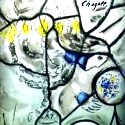
[ The following is related to our Torah reading for this week, Parashat Emor.... ]
05.16.16 (Iyyar 8, 5776) Our Torah portion this week begins by explaining special requirements for Israel's priests, and then goes on to list the yearly cycle of Sabbaths and the seasonal festivals. First of all the priests (kohanim) were required to be "perfect," without any physical defect or uncleanness that might render them unfit for service. Everything about the priests – their clothing, hair style, skin condition, and especially their adherence to the meticulous steps required to offer the daily sacrifice (לֶחֶם אֱלהָיו) - was to be "defect free," and any deviation might incur the penalty of death itself (Lev. 10:2; Num. 4:15, 2 Sam. 6:6-7). On the other hand, what sometimes disqualified a priest were things simply beyond his control, for instance, a variety of physical disabilities such as blindness, having a limp or disfigured limb, and so on (see Lev. 21:16-21).
Thinking about these requirements raises some provocative questions concerning the meaning of "perfection" in our lives, and particularly how we, as a deeply flawed people, can possibly be "perfect." The question is radical and affects how we are to understand practical holiness or the idea of "sanctification": Are we to seek to be perfect people, and if so, how do we understand what this means? Is our spirituality bound up with perfectionism, with flawless performance, and with always being and doing what is right?
In the Sermon on the Mount Yeshua warned that our righteousness should exceed that of the religious leaders of his day (Matt. 5:20), and went on to say: "be perfect, as your heavenly Father is perfect" (Matt. 5:48). Here we note that the Greek word translated "perfect" (τέλειος) may mean "mature" or "fully developed" more than morally flawless, though regarding moral and spiritual practice this distinction is not clear cut, especially if by "mature" we mean godly in character, as the context of Yeshua's statement clearly implies (see Matt. 5:1-48). The Hebrew word translated as "perfect" (תָּמִים) can also mean "complete," but it can connote being "wholehearted," "sound," or even healed (שָׁלֵם). So the question arises, does the word "perfect" mean "flawless" or "healed" -- or perhaps both?
Of course we affirm that God alone is truly perfect (Deut. 32:4; Psalm 18:30), completely good (Matt. 19:17), flawlessly righteous (Psalm 145:17), entirely holy (Isa. 6:3; Rev. 15:4), and peerlessly unique (Exod. 15:11; Jer. 10:6-7), but how can we relate to God's overmastering perfection in the midst of our daily flaws and chronic imperfections? How dare we approach "to offer the bread of God" (Lev. 21:17)?
Followers of the LORD are called to be a nation of priests, a "select people," set apart to serve God in holiness (Exod. 19:5-6; 1 Pet. 2:9; Lev. 11:45), but it is clear we are blemished, imperfect, blind, halt, needy, and unclean... This is common to the human condition: all of us, Jew or non-Jew alike, are broken, flawed, and in the midst of the inevitable flow of life that leads to death and decay (Rom. 3:23). We are sick with sin and unable to heal ourselves, and therefore we need a radical transformation - "deliverance from ourselves" – that must come through divine intervention and the miracle of spiritual rebirth (John 3:3,7).
Nevertheless in this world the paradox still remains: we are finite yet long for the undying, the infinite; we are in flux yet anchored in hope; we are a "new creation" yet still saddled with the old nature; we are made holy yet we live in the midst of the profane; we are purified yet still need cleansing; we are healed yet are still wounded; we are redeemed of God yet still need to turn to God in teshuvah; we die daily yet have eternal life. Our hearts are to be a divine sanctuary, yet we are powerless to make God appear in our midst...
Perfection haunts us; we often confuse the ideal and the real. Our romantic visions fail us; all of us are strangers, wanderers, in lonely exile. And the question then becomes – how do we embrace the "already-not-yet," the process, the fleeting days with their poignant moments – within the context of real hope, a vision that heals and brings us real comfort? How do we make peace with our imperfections, our present darkness, and our hunger for deliverance? How do we envision healing in the midst of our brokenness?
For more see: "Perfection and Holiness: Further thoughts on parashat Emor."
 |
Parashat Emor - אמור

[ The following is related to our Torah reading for this week, Parashat Emor.... ]
05.15.16 (Iyyar 7, 5776) Our Torah portion for this week (parashat Emor) lists the eight main holidays revealed in the Jewish Scriptures. In the Torah, these "holidays" are called "appointed times" (i.e., mo'edim: מוֹעֲדִים), a word which comes from the Hebrew root meaning "witness" (עֵד). Other words from this root include edah (עֵדָה), a "congregation," edut (עֵדוּת), a "testimony," and so on. The related verb ya'ad (יָעַד) means "to meet," "to assemble," or even "to betroth." The significance of the holy days, then, is for the covenant people of the LORD to bear witness to God's love and faithfulness. As it is written:
כָּל־אָרְחוֹת יְהוָה חֶסֶד וֶאֱמֶת
לְנצְרֵי בְרִיתוֹ וְעֵדתָיו
kol · or·chot · Adonai · che·sed · ve·e·met
le·no·tze·rei · ve·ri·to · ve·e·do·tav

"All the paths of the LORD are love and truth
to the ones guarding His covenant and His testimonies."
(Psalm 25:10)

Hebrew Study Card
Metaphorically the paths of the Lord (orechot Adonai) are likened to ruts or grooves created by the wheels of a caravan (i.e., orechah: ארְחָה) passing repeatedly over the same ground. These paths signify the Divine Presence journeying with God's children in this world. In temporal terms, we are able to discern the path by means of the divine calendar. God's love and faithfulness attend to His covenant (brit) and to the commemorations of the yearly "appointed times" that testify of God's faithful love. Keeping God's testimonies, then, means that we will be careful to observe the holidays in order to witness to God's truth...
"Speak to the people of Israel and say to them, 'These are the appointed times of the LORD (מוֹעֲדֵי יְהוָה) that you shall proclaim as holy convocations (מִקְרָאֵי קדֶשׁ); they are My appointed times'" (Lev. 23:2). Note that these hallowed times - the very first of which is the weekly Sabbath - are "of the LORD," and that means they should be regarded as appointments given by God Himself to help draw us closer to Him, to reveal His prophetic truth, and to remind ourselves of His great plan for our lives.
Please see the quick summary for Emor for more information. You can also download the Shabbat Table Talk for this portion here:
Words of Listening...

05.13.16 (Iyyar 5, 5776) In heaven there is only the language of truth, and truth is the language of heaven. "If we ask according to his will, he hears us..." (1 John 5:14). This means that words find their traction only in honesty of the heart, in the midst of our deepest need. Only in "fear and trembling" can we talk with God, though when we pray fervently, our words may trail off until we become silent.... But it is there, in the silence of the soul, that we may learn to listen to the Spirit and hear God's voice. When we seek first the kingdom of God, we will lay aside everything else, quiet our hearts, and focus our will. Seeking God in this way is an end in itself, for whatever else we may seek must be subordinated to this greater seeking. "You will seek me and find me, when you seek me with all your heart" (Jer. 29:13).
Soren Kierkegaard wrote, "No person is saved except by grace; but there is one sin that makes grace impossible, and that is dishonesty; and there is one thing God must forever and unconditionally require, and that is honesty." Confession means "saying the same thing" about ourselves that God says - and that means not only acknowledging our sins, but also affirming that we are loved by God. "Love hopes all things" (1 Cor. 13:7), and therefore the language of truth is always heard in hope.... Shabbat Shalom Chaverim!
 |
Loving our Friend...

[ The following is related to this week's Torah reading (i.e., parashat Kedoshim) and our duty to love our friend (i.e., "neighbor") as we love ourselves... ]
05.13.16 (Iyyar 5, 5776) From our Torah portion this week we read, "You shall not cheat your friend" (Lev. 19:13). Apart from the obvious sins of defrauding your friend or taking your friend for granted, the sages comment that the failure to see goodness in your friend is considered cheating. Likewise, when you fail to pray for your friend, that too is cheating, as Samuel said, "God forbid (חָלִילָה) that I should sin against the LORD in ceasing to pray for you" (1 Sam. 12:23). Moreover, where it says "You shall not go about gossiping among your people" (Lev. 19:16), this means we should not seek the faults of others but instead use ayin tovah, the "good eye." "Love does no wrong to a neighbor; therefore love is the fulfilling of the law" (Rom. 13:10). Beloved, let us love one another, for love is of God (1 John 4:7).
"Lord, make me an instrument of Your peace. Where there is hatred, let me sow love; where there is injury, pardon; where there is doubt, faith; where there is despair, hope; where there is darkness, light; where there is sadness, joy... O, Divine Master, grant that I may not so much seek to be consoled as to console; to be understood as to understand; to be loved as to love; For it is in giving that we receive; it is in pardoning that we are pardoned; it is in dying that we are born again to eternal life."
- Francis of Assisi
Torah of the Heart...

05.13.16 (Iyyar 5, 5776) The sages said that "the laws of the Torah were given that people should live by them and not that they should die by them" (Lev. 18:5). This is true, though it is not true without qualification. Legalists and spiritual perfectionists are often depressed because they never feel like they've done enough or have fulfilled their duty. They feel inadequate, and this leads to severity and even to hardness of heart. However, such spiritual failure serves as a "halfway house" to the truth, since the law was intended to reveal our sinful condition and to lead us to a state of brokenness and surrender (Gal. 3:24-25). As is is written, "For from the law comes the knowledge of sin" (διὰ γὰρ νόμου ἐπίγνωσις ἁμαρτίας), but now the righteousness of God (צִדְקַת אֱלהִים) apart from the law is manifested, being witnessed by the law and the prophets" (Rom. 3:20-21, Gal. 3:19). The phrase "apart from the law" means from an entirely different sphere from that which says, "do this and live." It is the "righteousness" (δικαιοσύνη) that comes from God, not from man. Now the law by itself - though "holy, just, and good" - is powerless to give life, even as it reveals our need for life "outside of itself," so to speak. Therefore we "die to the law" that we might live to God (Gal. 2:19). God's love, then, is the miracle that alone gives us life and power so that we keep the truth of the law -- its heart or inner meaning -- though we transcend the legal idea of justification by trusting in the healing reality of Yeshua our Savior (ישוע מושיענו).
 |
First and last Word...
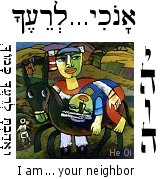
[ The following concerns this week's Torah reading, parashat Kedoshim (Lev. 19:18)... ]
05.13.16 (Iyyar 5, 5776) The classical Jewish sages often divide the Ten Commandments as those primarily between man and God (לָמָקוֹם) and those between man and his neighbor (לְחֲבֵרוֹ), but these categories resolve to one and the same thing. To see this, note that the Commandments begin with the word anochi ("I AM") and end with le're'kha ("to/for your neighbor"). Joining these together says "I AM your neighbor," indicating that the LORD Himself is found in your neighbor. The first and last word of the law of Moses, then, is simply "I AM your neighbor." Every social transgression is therefore a transgression against God, and vice-versa. As our Scriptures teach, "If anyone says, "I love God," and hates his brother, he is a liar," and "love fulfills the law" (1 John 4:20; Rom. 13:8). When we love our neighbor as ourselves (אָהַבְתָּ לְרֵעֲךָ כָּמוֹךָ), we are in effect showing love for the LORD.
 |
"Blessed are the merciful, for they shall receive mercy" (Matt. 5:7). This is the "like-for-like" principle of our judgments: As we forgive, so we are forgiven; as we give, so is given unto us, and so on. How we regard others reflects who we are... The Moishe Leib of Sassov commented on the verse, "You shall not bear a grudge against your friend" (Lev. 19:18) by saying that when you show mercy to others, this awakens the heavens and divine mercy is shown to you as well. Indeed, your forgiveness is your forgiveness. "Middah keneged middah," as you measure, so it will be measured back to you as well...
God's Heart for Zion...

[ Today is Yom HaAtzma'ut (יוֹם הָעַצְמָאוּת), Israel's Independence Day. Am Yisrael Chai! The people of Israel live! We will not forget you, O Jerusalem (Psalm 137:5). ]
05.12.16 (Iyyar 4, 5776) Often it is not what is said that matters, but what is left unsaid... There is an unspoken assumption in the "theological culture" of many churches that Israel and the Jewish people are relatively unimportant for Christians today. There is little passion for the vision of Zion, and meager heeding the words of the prophets who repeatedly promised Israel consolation and a future and a hope. This is the proverbial "white elephant" in the room of institutionalized Christian churches. As I've said before, what you believe about ethnic Israel and Zion will affect ALL other areas of your theology.
Just the other day I met a pastor of a church in my area who believes that the "true Israel" are churchgoers (presumably like himself), and that ancient Israel belongs to the dustbin of history... According to him, Israel represents a sort of "object lesson" of what it means to be "cast off" and "forsaken" by the LORD! When I gently reminded him that God Himself chose to reveal Himself to the world as a Jewish man who spoke Hebrew and who read the Torah in synagogues, he was unmoved and even began to regard me with "theological suspicion." Oy vey. How can Christian pastors and teachers dogmatically assume that the Torah is no longer applicable to Christians when they don't even study Torah or bother to learn the meaning of the Hebrew texts? Indeed, how can they truly apprehend the language of the New Testament when they clearly suppress and disregard its God-given context? What are we to make of such cocksure ignorance, such institutionalized prejudice? Sadly, as the American philosopher William James astutely observed, most people believe they are thinking when they are merely rearranging their prejudices...
"To the Jew first..." and this especially means that the message of the Messiah's love is for the Jewish people. Christians who ignore their spiritual debt to the Jewish people and write them off as "unreachable" because of "God's sovereign purposes" are like Pontius Pilate who vainly washed his hands of the guilt he richly warranted... So-called pastors or teachers who deny God's unconditional promises given to ethnic Israel need to rethink whether they are serving the LORD God of Israel - or mere men (Gal. 1:10).
For more on this subject see, "To the Jew First..."
 |
Redirection and Rebuke...
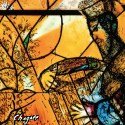
[ The following is related to this week's Torah reading, parashat Kedoshim... ]
05.12.16 (Iyyar 4, 5776) We must ask God for great wisdom whenever we seek to correct others... For example, when Nathan the prophet went to King David to confront him about his sin with Bathsheba, he told David the story of the poor man who was robbed of the only lamb he had by a rich man. David's sense of justice was outraged and he instinctively ordered the perpetrator to be put to death. Only after David had pronounced judgment on the offender did Nathan reveal his parable: Attah ha-ish! "You are that man!" (2 Sam. 12:7). As the Baal Shem Tov remarked, God proceeds similarly with anyone due to be punished for a transgression - by retelling the story of his or her sin in a slightly disguised form, as if it had been committed by someone else. When the person condemns the fictitious sinner, he therefore comes to terms with his own sinfulness and culpability... Therefore we are instructed to judge others with awareness of our own frailty and with kaf zechut - the benefit of doubt extended toward the other person. As Yeshua reminded us, "Do not judge by appearances," but "be'tzedek tishpot amitekha" (בְּצֶדֶק תִּשְׁפּט עֲמִיתֶךָ), in righteousness judge your neighbor (John 7:24, Lev. 19:14).
We all have a proverbial "log" in our own eye whenever we attempt to remove the "speck" we see in someone else's (Luke 6:42)... Using an "indirect method" method of communication requires a good deal of wisdom, however, and in general it is a good to refrain from a direct form of rebuke, unless the other person truly understands that you value and care for them. Above all it must be remembered that it is God's job to convict the heart of sin (John 16:18).
 |
Forgiveness and Love...
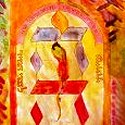
[ The following is related to this week's Torah reading, parashat Kedoshim... ]
05.12.16 (Iyyar 4, 5776) Notice that the great commandment to love your neighbor "kamocha" (i.e., "as yourself") is given in connection with forgiveness. Leviticus 19:18 reads, Lo tikom, ve'lo titor (לא־תִקּם וְלא־תִטּר): "You must not take vengeance nor bear a grudge ... but you must love your neighbor as yourself. I am the LORD." This means, among other things, that we must learn to forgive ourselves if we are to find hope... As an aside, let me ask why the oft-repeated phrase, "I am the LORD" appears after so many of the Torah's commandments (i.e., "You shall do x... I am the LORD")? The sages reply, to remind us that God sees everything and nothing is hidden from His eyes... God knows our hearts, chaverim, and perfectly understands our inner intentions. Yeshua, the Word of the LORD, is "sharper than any double-edged sword, piercing even to the point of dividing soul from spirit, and joints from marrow; it is able to judge the desires and thoughts of the heart" (Heb. 4:12).
 |
The King of Truth...
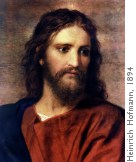
05.12.16 (Iyyar 4, 5776) Yeshua attested to Pontius Pilate, "For this reason I was born, and for this reason I came into the world - to testify to the truth. Everyone who belongs to the truth listens to my voice" (John 18:38). Our Torah portion this week (Kedoshim) includes the statement, Lo ta'amod al dam re'ekha: "You must not stand idly by when your neighbor's life is at stake" (Lev. 19:16). The principle of lo ta'amod (לא תַעֲמד) means that we have a moral duty to speak the truth when others are victimized. "Standing idly by" can therefore mean refusing to come forward with the truth about a situation from fear of the consequences, but it can also mean excusing the sin of our culture and of our friends. "A truthful witness (עֵד אֱמֶת) rescues lives, but the one who breathes lies (יָפִחַ כְּזָבִים) brings deception" (Prov. 14:25). As it is written, "You shall not spread a false report. You shall not join hands with a wicked man to be a malicious witness (עֵד חָמָס)" (Exod. 23:1). It is the truth that sets people free to serve God, but this presupposes the ability to discern how we all become enslaved to deception. "You are to distinguish between the holy (i.e., ha-kadosh: הַקּדֶשׁ) and the common (i.e., ha-chol: הַחל), and between the unclean (i.e., ha-tamei: הַטָּמֵא) and the clean (i.e., ha-tahor: הַטָּהוֹר)" (Lev. 10:10, see also Ezek. 44:23). Just as God separated the light from the darkness (Gen. 1:4), so we are called to discern between (בֵּין) the realms of the holy and the profane, the sacred and the common, and the clean and the unclean. Indeed, the Torah states "God called the light Day, and the darkness he called night," thereby associating His Name with the light but not with the darkness (Gen. 1:5). "For you all are sons of the light and sons of the day. We are not of the night nor of the darkness" (1 Thess. 5:5). We are instructed therefore to wear the "armor of light" (τὰ ὅπλα τοῦ φωτός, Rom. 13:12) and to be equipped to wage spiritual warfare in God's Name (Eph. 6:11-18).
 |
Central Idea of Torah...

05.11.16 (Iyyar 3, 5776) The focal point and the very heart of what practical holiness means is stated as the duty: ve'ahavta le're'akha kamokha (וְאָהַבְתָּ לְרֵעֲךָ כָּמוֹךָ) - "You shall love your neighbor as yourself" (Lev. 19:18). Note that the direct object of the verb (i.e., ahav - to love) is your "neighbor" (רֵעַ). But who, exactly, is your neighbor? Some have claimed that the word re'a (neighbor) refers only to one's fellow Jew or friend, and not to others at large in the world. However this is certainly false, since the "stranger" (ger) is explicitly identified to be an object of our love (see Lev. 19:34). And note that when Yeshua was asked this very question, he turned it around. Instead of attempting to find someone worthy of neighborly love, we are asked to be worthy and loving neighbors ourselves (Luke 10:29-37).
וְאָהַבְתָּ לְרֵעֲךָ כָּמוֹךָ אֲנִי יְהוָה
ve·a·hav·ta · le·re·a·kha · ka·mo·kha · a·ni · Adonai

"You shall love your neighbor as yourself: I am the LORD."
(Lev. 19:18)

Download Study Card
In this connection, it is interesting to note that the gematria for the Hebrew commandment, "You shall love your neighbor as yourself" (i.e., וְאָהַבְתָּ לְרֵעֲךָ כָּמוֹך) equals 820, the same value as the word yekidashti (וְקִדַּשְׁתִּי), "And I [the LORD] will sanctify" (Exod. 29:44). When God commands us to "love your neighbor as yourself," he graciously includes the addendum: "I am the LORD," which the sages understood to mean, "I will help you to do this," or (in this case) "I will sanctify you through your acts of lovingkindness."
Love is the central idea of all true Torah. Though there are some slight language differences between the Exodus and Deuteronomy versions of the Ten Commandments, both begin with "I AM" (אָנכִי) and both end with "[for] your neighbor" (לְרֵעֶךָ). Joining these together says "I am your neighbor," indicating that the LORD Himself is found in your neighbor. When we love our neighbor as ourselves (אָהַבְתָּ לְרֵעֲךָ כָּמוֹךָ), we are in effect demonstrating our love for the LORD. We must learn to disregard the claims of our ego and cling to the idea of chesed. So who is your neighbor? You are -- to every other soul you may encounter this day.
 |
Spelling out "Repentance"

[ The following is related to this week's Torah reading (i.e., parashat Kedoshim) and our duty to love our neighbor as we love ourselves... ]
05.11.16 (Iyyar 3, 5776) Rabbi Sussya of Anipol once said: "There are five verses in the bible that constitute the essence of the Torah. These verses begin in Hebrew with one of these letters: Tav (תּ), Shin (שׁ), Vav (ו), Bet (בּ), and Hey (ה), which form the word for repentance, "teshuvah" (תְּשׁובָה). The five verses are 1) Tamim tiheyeh (תָּמִים תִּהְיֶה): "Be wholehearted before God" (Deut. 18:13); 2) Shiviti Adonai (שִׁוִּיתִי יְהוָה): "I have set the LORD always before me" (Psalm 16:8); 3) Va'ahavta lere'akha (וְאָהַבְתָּ לְרֵעֲךָ): "Love your neighbor as yourself" (Lev. 19:18); 4) Bekhol derakekha (בְּכָל־דְּרָכֶיךָ): "In all your ways know Him" (Prov. 3:6); and 5) Higid lekha (הִגִּיד לְךָ): "Walk humbly with your God" (Micah 6:8). In other words, the way of teshuvah, of answering God's call for you to return to Him, is to sincerely set the LORD before you, to love others, and to walk out your days in heartfelt gratitude.
הִגִּיד לְךָ אָדָם מַה־טּוֹב
וּמָה־יְהוָה דּוֹרֵשׁ מִמְּךָ
כִּי אִם־עֲשׂוֹת מִשְׁפָּט וְאַהֲבַת חֶסֶד
וְהַצְנֵעַ לֶכֶת עִם־אֱלהֶיךָ
hig·gid · le·kha · a·dam · mah · tov
u'mah · Adonai · do·resh · mi·me·kha
ki · im · a·sot · mish·pat · ve·a·ha·vat · che·sed
ve·hatz·ne·a · le·chet · im · e·lo·hey·kha

"He has told you, O man, what is good, and what the LORD requires of you:
Only to do justice, and to love kindness, and to walk modestly with your God"
(Micah 6:8)

Hebrew Study Card
In other words, "teshuvah" (repentance) may be seen as an acronym that stands for being wholehearted, seeking God, loving others, knowing God in all your journey, and walking in humility. May the LORD our God impart the miracle of teshuvah to each of us today....
Sensing the Sacred...
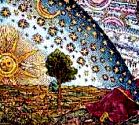
05.11.16 (Iyyar 3, 5776) The Torah records God's first act of creation with the imperative utterance: "Let there be light" (i.e., yehi or: יְהִי אוֹר), and then goes on to say that "God separated (וַיַּבְדֵּל) the light from the darkness (Gen. 1:3-4). It is this "separation," or distinction, that is foundational to the concept of kedushah (קְדֻשָּׁה), or "holiness." Holiness is also expressed in the distinction between ordinary and sacred time: "God blessed the seventh day and made it holy" (יְקַדֵּשׁ) because on it God rested from all his work that he had done in creation" (Gen. 2:3). Therefore we are repeatedly told to "distinguish between the holy and the common, and between the unclean and the clean" (Lev. 10:10). Note that the word translated "distinguish" (וּלֲהַבְדִּיל) comes from the same verb used to describe how God separated the light from the darkness. In order to do this, we need understanding (i.e., binah: בִּינָה), or the ability to distinguish between (בֵּין) realms of reality. As it is written, "You shall be holy to me, for I the LORD am holy and I have separated you (וָאַבְדִּל) from other people that you should be mine" (Lev. 20:26).
וִהְיִיתֶם לִי קְדשִׁים כִּי קָדוֹשׁ אֲנִי יְהוָה
וָאַבְדִּל אֶתְכֶם מִן־הָעַמִּים לִהְיוֹת לִי
vi·yi·tem · li · ke·do·shim · ki · ka·dosh · a·ni · Adonai
va·av·dil · et·khem · min-ha·a·mim · li·he·yot · li

"You shall be holy to me, for I the LORD am holy
and I have separated you from the peoples to be mine"
(Lev. 20:26)

There is no other way to approach the Holy One apart from consciousness of His infinite glory and unsurpassable worth. "I will lift up my eyes to the hills" (Psalm 121:1). As the Holy One (i.e., ha-kadosh: הַקָּדוֹשׁ), the LORD (יהוה) is utterly unique, distinct, sacred, and set apart as the only One of its kind. He alone is worthy of true worship and adoration, since He alone is utterly peerless, without rival, and stands in relation to the world as Creator, Redeemer, and Lord. To affirm the LORD is holy is to be conscious that He is utterly sacred.
Note: Being "holy" does not mean being sanctimonious or having a sour face about the world and its carnal pleasures. It has nothing at all to do with affected spirituality, angry pride, or the fear of becoming unclean... Indeed, some of the most holy moments are those of love, joy, peace, as well as times of struggle, sorrow, affliction, and fiery temptation. Holiness is ultimately "ontological," which means it has to do with reality... A person can be holy and yet sinful; he can be holy and yet feel lost or abandoned. On the other hand, a person can be seemingly sinless, morally upright, and yet be completely unholy.
 |
Practical Holiness...

05.10.16 (Iyyar 2, 5776) Our Torah portion this week (Kedoshim) reveals that the "appointed times" (i.e., mo'edim: מוֹעֲדִים) were given by God to help us turn away from the omnipresent urge within the human heart to embrace vanity: "Every one of you shall revere his mother and his father and guard (שָׁמַר) my Sabbaths (שַׁבְּתתַי)... Do not turn to worthlessness (i.e., אֱלִיל) or make for yourselves any molten gods" (Lev. 19:3-4). In other words, the Biblical holidays - including weekly Shabbat, monthly Rosh Chodesh, and so on - were intended to help us to sanctify ("set apart," "make holy") the times and seasons in order to remind us of God's Presence (Psalm 104:19). Therefore they are called mikra'ei kodesh (מִקְרָאֵי קדֶשׁ), "times in which holiness is proclaimed" (Lev. 23:2). The Torah's declaration that these days are holy implies that they are set apart for special activities, such as commemorating God as our Creator (Shabbat), our Redeemer (Passover), our Resurrection (Firstfruits), our Law Giver (Shavuot), our King (Rosh Hashanah), our High Priest (Yom Kippur), our Shelter (Sukkot), and so on. In this connection it should be noted that it is a mistake to assume that the divine calendar was somehow abrogated with the cross of Yeshua, since all of the Jewish holidays center on Him, and indeed the advent of the Ruach Ha-Kodesh (Holy Spirit) occurred precisely after the prescribed 49 day countdown to Shavuot (Acts 1:8; 2:1-4).
Presently our lives "suspended" between two worlds - this phenomenal world with its illusions (olam hazeh), and the real world of spiritual substance and meaning (olam haba). We exist in an "already-not-yet" state of expectation and yearning where we must consciously mediate the truth of heaven by bringing it "down to earth." This is a truth war, and by truth I do not mean intellectual knowledge as much as the living truth that marks the lifestyle and vision of a follower of Messiah. We consciously remember Torah truth; we choose to always "set the LORD before us," and take "every thought captive to the passion of Messiah..." May God help us heed the call to walk in holiness by the power of His love and grace. Amen.
For more on this subject, see "Practical Holiness: Further thoughts on Kedoshim."
 |
God's "Super Sign" of Israel...

[ The following is related to Yom HaAtzma'ut (יוֹם הָעַצְמָאוּת) - Israel's Independence Day - which begins May 11th at sundown this year. Happy 68th Birthday, Israel! ]
05.10.16 (Iyyar 2, 5776) After the Jewish people had suffered for nearly 2,000 years of exile as clearly foretold by Moses (see Lev. 26:38, 44; Deut. 28:64-64) and the other Hebrew prophets (Isa. 43:5-6; Jer. 30:11; Joel 3:2; Ezek. 36:8-10; Hos. 9:1-10, etc.), Israel was miraculously reborn as a nation in their ancient homeland on May 14, 1948 (Iyyar 5, 5708). Today Jews across the world celebrate Iyyar 5 as Israeli Independence Day, which this year will be observed a day earlier, on Wednesday May 11th at sundown.
Israel's Independence Day is called Yom Ha'atzma'ut (יוֹם הָעַצְמָאוּת), the "day of independence." In Hebrew, the word independence (atzma'ut) comes from atzmi - "my bones" (i.e., etzem: עֶצֶם), so the name itself alludes to God's glorious promise to revive the "dry bones" (עֲצָמוֹת) of Israel by bringing the Jewish people back from their long exile during the End of Days (Ezek. 37:1-6). "Son of man, can these bones live?"
But why should Christians care about ethnic Israel? After all, many Christian denominations advocate some version of "Replacement Theology" and regard the promises God made to the Jewish people as belonging exclusively to their church... The existence of the modern State of Israel therefore evokes little thanks to God from these groups, and some of their ranks even regard Israel's revived presence on the world stage as an embarrassment to their typically "liberal" theology. Hence we see the (remarkably bad) phenomena of so-called "Christian" church denominations that express anti-Israel sentiment, even asking their followers to divest investments in Israel on behalf of the "Palestinians," etc.
The title "Christ" refers to the anointed King of Israel, the Mashiach (מָשִׁיחַ)... To say "Jesus Christ" is therefore to affirm that Yeshua is none other than the Messiah, the rightful King of Israel (מֶלֶךְ יִשְׂרָאֵל). Followers of Jesus, the One born "King of the Jews" (Matt. 2:2), should therefore care deeply about Israel because the existence of Jewish people - and of the nation of Israel in particular - demonstrates that the LORD (יהוה) is completely faithful to the covenant promises He made to our patriarchs (e.g., Gen. 15:9-21). Indeed, the Name of God is forever designated as "the God of Abraham, the God of Isaac, and the God of Jacob" (Exod. 3:15), just as it is also the "LORD God of Israel" (יְהוָה אֱלהֵי יִשְׂרָאֵל). The perpetuity of the Jewish people - despite so much worldwide and satanic hatred over the millennia - is an awesome testimony of God's loyal love (Jer. 31:35-37). עַם יִשְׂרָאֵל חַי / am Yisrael chai: "The people of Israel live!" Israel is a sign of the "sure mercies of David" (חַסְדֵי דָוִד הַנֶּאֱמָנִים) that are revealed in Yeshua, the Jewish Messiah (Isa. 55:1-6). Moreover, the New Covenant itself, as foretold by the prophet Jeremiah, explicitly promises the perpetuity of the Jewish people throughout the ages (Jer. 31:31-37):
Behold, the days are coming, declares the LORD (יהוה), when I will make a new covenant (בְּרִית חֲדָשָׁה) with the house of Israel and the house of Judah, not like the covenant that I made with their fathers on the day when I took them by the hand to bring them out of the land of Egypt, my covenant that they broke, though I was their husband, declares the LORD. But this is the covenant that I will make with the house of Israel after those days, declares the LORD: I will put my law (תּוֹרָה) within them, and I will write it on their hearts. And I will be their God, and they shall be my people. And no longer shall each one teach his neighbor and each his brother, saying, 'Know the LORD,' for they shall all know me, from the least of them to the greatest, declares the LORD. For I will forgive their iniquity, and I will remember their sin no more."
Thus says the LORD, who gives the sun for light by day and the fixed order of the moon and the stars for light by night, who stirs up the sea so that its waves roar– the LORD of hosts is his Name: "If this fixed order departs from before me, declares the LORD, then shall the offspring of Israel (זֶרַע יִשְׂרָאֵל) cease from being a nation before me forever." Thus says the LORD: "If the heavens above can be measured, and the foundations of the earth below can be explored, then I will cast off all the offspring of Israelfor all that they have done, declares the LORD. – Jer. 31:35-36
According to this theologically critical passage, if you saw the sun shine today or the stars in the night sky, you can be assured that God's promise to preserve the "offspring of Israel" -- (i.e., zera Yisrael: זֶרַע יִשְׂרָאֵל) -- is in effect. Indeed, in the world to come, heavenly Jerusalem will have the names of the twelve tribes of Israel engraved upon its gates (Rev. 21:12). Note well that this is the only occurrence in the entire Tanakh (i.e., "Old Testament") that the New Covenant (בְּרִית חֲדָשָׁה) is explicitly mentioned... It is a foundational passage of Scripture for those who claim to be followers of the Jewish Messiah.
All the blessings Christians enjoy ultimately come from the root of God's covenants with Israel... Yeshua our Savior was born the King of the Jews, and plainly said salvation is "from the Jews" (Matt. 2:2; 27:11; John 4:22). The Apostle Paul clearly warned those who think the church has "replaced" Israel: "Remember it is not you who support the root, but the root that supports you" (Rom. 11:18). This doctrine is so foundational that it may be rightly said that how you think about Israel will affect every other area of your theology. Indeed, the nation of Israel is God's "super sign" that He is faithful to His covenant promises (Jer. 31:35-37). Celebrating Israel's existence acknowledges God's loyal love for us all! For more on this subject, see the article, "Is Christianity Anti-Jewish?"
In the holy Torah we read how God said to Moses, "Say this to the people of Israel, 'The LORD, the God of your fathers, the God of Abraham, the God of Isaac, and the God of Jacob (אֱלהֵי אַבְרָהָם אֱלהֵי יִצְחָק וֵאלהֵי יַעֲקב), has sent me to you.' This is my name forever (זֶה־שְּׁמִי לְעלָם), and thus I am to be remembered throughout all generations'" (Exod. 3:15). "Your Name, O LORD, endures forever, your renown, O LORD, throughout all ages" (Psalm 135:13). Therefore the prophet cries: "in the east give glory to the LORD; in the coastlands of the sea, give glory to the Name of the LORD, the God of Israel" (אֱלהֵי יִשְׂרָאֵל).
יְהוָה שִׁמְךָ לְעוֹלָם
יְהוָה זִכְרְךָ לְדר־וָדר
Adonai · shim·kha · le'o·lam
Adonai · zikh·re·kha · le'dor · va'dor

"Your Name, O LORD, endures forever,
your renown, O LORD, throughout all ages"
(Psalm 135:13)

Being the Beloved...

[ The following is related to this week's Torah reading, parashat Kedoshim... ]
05.09.16 (Iyyar 1, 5776) Our Torah portion this week begins: "The LORD spoke to Moses, saying: 'Speak to all the congregation of the people of Israel and say to them: You shall be holy (קדשִׁים תִּהְיוּ), for I the LORD your God am holy'" (Lev. 19:1-2). Because we are chosen to be God's people, his redeemed children, we should be holy, just as God is holy (see 1 Pet. 1:15-16). Holiness, however, is not a matter of what you do (such as wrapping yourself in religious rituals) but is instead a matter of who you are. You are someone beloved who has been rescued and taken up from the "depths of Egypt" to be united with God. Holiness is something you receive within your heart; it is a gift of being "set apart" to be sacred and beloved by God. Genuine holiness (i.e., kedushah) is connected with love and grace. "Being holy" therefore means coming alive and looking away from that which deadens the spirit (Col. 3:1-4); it means accepting yourself as the Beloved of the LORD...
As I've said before, the word kedushah (קְדוּשָׁה) means sanctity or "set-apartness" (other Hebrew words that use this root include kadosh (holy), Kiddush (sanctifying the wine), Kaddish (sanctifying the Name), kiddushin (the ring ceremony at a marriage), and so on). Kadosh connotes the sphere of the sacred that is radically separate from all that is sinful and profane. As such, it is lofty and elevated (Isa. 57:15), beyond all comparison and utterly unique (Isa. 40:25), entirely righteous (Isa. 5:16), glorious and awesome (Psalm 99:3), full of light and power (Isa. 10:7), and is chosen and favored as God's own (Ezek. 22:26).
 |
Prophetic Significance of Israel...

[ The following is related to Yom HaAtzma'ut (יוֹם הָעַצְמָאוּת) - Israel's Independence Day - which begins Wednesday, May 11th at sundown this year. Happy 68th Birthday, Israel! ]
05.09.16 (Iyyar 1, 5776) Can a case be made that we among the "terminal generation" before the return of Yeshua? The Torah predicted that the "End of Days" would occur sometime after the return of the Jewish people from their worldwide dispersion back to the land of Israel (Deut. 30:1-3), and indeed the theme of exile and return is repeated in the prophets (Jer. 23:3; 32:37-38; Ezek. 37:21, etc.). Therefore it is surely extraordinary that Israel was reborn as a nation in their ancient homeland on May 14, 1948 (Iyyar 5, 5708), after nearly 2,000 years of exile... Moreover, the existence of the modern State of Israel is entirely consonant with New Testament prophecies regarding the advent of the Messiah, since Yeshua taught that the Jewish people would be in the land of Israel at the time of his second coming, and that the city of Jerusalem would be surrounded by enemies of the Jewish state (see Matt. 24-25; Mark 13, Luke 21). Furthermore, if we understand a "generation" to mean 70-80 years in duration (as stated in Psalm 90:10), then when Yeshua said, "this generation (ἡ γενεὰ αὕτη) shall not pass until all these things take place" (Matt. 24:34), he was referring to the generation that would originate with the restoration of the modern State of Israel, which further implies that Daniel's 70th Week (i.e., the Great Tribulation) could begin very soon. And while it is true that "no one knows the day or hour" of Yom Adonai haGadol (יוֹם־יְהוָה הַגָּדוֹל), the "great day of the LORD," Yeshua faulted the scribes and the Pharisees for failing to discern "the signs of the times" (Matt. 16:3) and for missing the "time of their visitation" (Luke 19:44).
מִי־שָׁמַע כָּזאת
מִי רָאָה כָּאֵלֶּה
הֲיוּחַל אֶרֶץ בְּיוֹם אֶחָד
אִם־יִוָּלֵד גּוֹי פַּעַם אֶחָת
mi · sha·ma · ka'zot
mi · ra'ah · ka'e·leh
hai·yu·chal · e·retz · be·yom · e·chad
im · yiv·va·led · goy · pa·am · e·chat

"Who has heard such a thing?
Who has seen such things?
Shall a land be born in one day?
Shall a nation be brought forth in one moment?"
(Isa. 66:8)

Like many other prophetic statements found in the Jewish Scriptures, this verse from the prophet Isaiah is "dual aspect," since it was both partially fulfilled when the Jewish people reestablished the State of Israel, but it will be entirely fulfilled at the outset of the Millennial Kingdom after the return of Messiah (see Isa. 66:7-16; Rom. 11:26). Meanwhile we behold the restoration of the "Fig Tree," and understand that the great harvest draws near, friends... May God help each one of us be awake, ready, with hearts full of steadfast faith (1 John 3:2-3; Titus 2:11-14; Matt. 24:32). Amen.
Regardless of how you may regard the prophetic events that herald the "end of the world," however, know this: Today might be your last in this world - your very own Rosh Hashanah when you will appear before the Judge and Creator of your life... Therefore live each day as if it might be your last and pray that God will help you to serve Him in the truth....
Note: Let me add that while we may discern that the time is indeed short, I do not believe in "date setting" or predicting the return of the LORD, since that is חוכמה אטומה, "sealed wisdom" known only to the Father (Matt. 24:36, Acts 1:7; 1 Thess. 5:2, etc.). Shalom.
 |
Parashat Kedoshim - קדשים

[ The following is related to this week's Torah reading, parashat Kedoshim... ]
05.08.16 (Nisan 30, 5776) Last week's Torah portion (Acharei Mot) concerned the yearly Yom Kippur ritual that purged the uncleanness and sin of the people and restored the Sanctuary to a state of purity. This week's Torah portion (Kedoshim) continues the theme of purity with the LORD saying to "the whole assembly of Israel" (כָּל־עֲדַת בְּנֵי־יִשְׂרָאֵל), "You must be holy because I, the LORD your God, am holy" (Lev. 19:2). Note that the commandment to speak to the "whole assembly" differs from earlier instructions ("Speak to the Israelites, and say to them..."), which has led some of the commentators to say that these instructions were to be taught to Israel in a more public way (i.e., be'hakel - "in full assembly"). At any rate, this portion lists more mitzvot (commandments) regarding practical ethics (musar) than any other of the Torah, thereby directly connecting the holiness of the community with obedience to God's moral truth...
After stating the foundational requirement to be holy, the LORD begins to explain, "Each of you must respect (i.e., yirah: יִרְאָה) his mother and his father, and you must keep my Sabbaths. I am the LORD your God" (Lev. 19:3). The duty to revere (or honor) one's parents recalls the Fifth Commandment (Exod. 20:12), which is the starting point of learning to respect other people in our lives. Notice that the word for "my Sabbaths" (שַׁבְּתתַי) implies both the keeping of the weekly Sabbath as well as the "appointed times" of the LORD. As we will see, sanctifying time is a way we can express practical holiness in our lives...
Various practical commandments are given in this Torah portion through which a Jew is sanctified, or set apart to be kadosh - holy - and therefore fit for relationship with God. God is not only "wholly Other" (i.e., transcendent) but also pervades all of creation (i.e., "immanent"), and those who are called into His Presence must therefore be holy themselves. Such practical holiness results in sanctification obtained through the observance of commandments (mitzvot). These commandments include both mitzvot aseh (commandments to do something) and mitzvot lo ta'aseh (commandments to refrain from doing something). In addition, chukkim, or "statutes" are given that further separate the Jew from the customs and profanity of the surrounding nations.
For example, though it is inevitable (and psychologically necessary) that we make judgments about other people, the Torah states, be'tzedek tishpot amitekha, "in righteousness shall you judge your neighbor" (see also John 7:24), which implies that we must use the "good eye" (ayin tovah) when we think of other people. Indeed, the focal point and the very heart of what practical holiness represents is stated as ve'ahavta le're'akha kamokha - "You shall love your neighbor as yourself." Note that the direct object of the verb (ahav - to love) is your neighbor. But who, exactly, is my neighbor? Some have claimed that the word rea (neighbor) refers only to one's fellow Jew - not to others at large in the world. However this is obviously false, since the "stranger" (ger) is explicitly identified to be an object of our love (Lev 19:34). And note that Yeshua the Mashiach answered this question by turning it around. Instead of attempting to find someone worthy of neighborly love, I am asked to be a worthy and loving neighbor myself (Luke 10:29-37).

The phrase ve'ahavta le're'akha kamokha (Lev. 19:18) is considered the most comprehensive rule of conduct toward others found in the entire Torah. The Talmud (Shabbat 31a) tells the story of how Rabbi Hillel, a contemporary of Yeshua, was once challenged by a pagan: "Make me a proselyte, on the condition that you teach me the whole Torah while I stand on one foot." Hillel agreed, and while standing on one foot said, "What is hateful to you, do not do to your neighbor: that is the whole Torah and the rest is commentary; go and learn it." Yeshua likewise said, "In everything, treat others as you would want them to treat you, for this is the point of the law and the prophets" (Matt 7:12). The apostle Paul - who was a student of Hillel's grandson Gamaliel - likewise wrote: "Love (ἡ ἀγάπη) does no wrong to a neighbor; therefore love is the fulfillment (πλήρωμα) of the law" (see Rom. 13:10, Gal. 5:14).
Notice that the commandment to love our neighbor is given in connection with forgiveness. Leviticus 19:18 reads, Lo tikom, ve'lo titor (לא־תִקּם וְלא־תִטּר): "You must not take vengeance nor bear a grudge ... but you must love your neighbor as yourself. I am the LORD." In Jewish tradition, "Yom Kippur does not atone until we have made peace with one another." In light of the greater glory of the New Covenant, this may be stated, "the Cross of Yeshua will not avail you unless you are willing to forgive others for their sins against you" (Matt. 6:14-15).
The problem, of course, is not that we don't know what our duty before God is, but rather finding the means to truly live a life of love and forgiveness toward others in this fallen world... But thanks be to God - the Holy Spirit enables us to do the impossible...
Happy Mother's Day note: I want to express my heartfelt thanks to God for all the mothers out there, and particularly for my own mom and for my dear wife Olga, who is such a loving and kind mother to our three sons... Thank you so much, and happy Mother's Day, dear ladies.... What would we be without you?
The Torah of Love...

05.06.16 (Nisan 28, 5776) "Whoever has my commandments and keeps them, such is the one who loves me. And the one who loves me will be loved by my Father, and I will love him and will manifest myself to him" (John 14:21). Note that the Greek word translated "manifest" means to "shine inside" (i.e., ἐμφανίζω, from ἐν, "in" and φαίνω, "shine"), indicating that the revelation would be inward light of the Presence of Messiah himself (Χριστὸς ἐν ὑμῖν, ἡ ἐλπὶς τῆς δόξης, Col. 1:27). As we receive God's love, as we embrace it as our own, the love of Messiah will become inwardly visible to you. This comes from a place of surrender and acceptance. As Paul Tillich said, "Sometimes in a moment of weakness light breaks into darkness, and it is as though a voice says, 'You are accepted; you are accepted... Do not seek for anything; do not perform anything; do not intend anything. Simply accept the fact that you are accepted.' If that happens to you, then you experience grace, and everything will be transformed." Dear Lord, Light of Salvation, shine your light upon us!
And may God's love shine within your heart, friend... Shabbat Shalom.
 |
The Heart of Atonement...
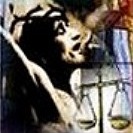
[ The following is related to our Torah reading this week, parashat Acharei Mot... ]
05.06.16 (Nisan 28, 5776) Most of our deepest anxieties come from the fear of death, whether we are conscious of this or not... Death represents fear of the unknown, fear of being abandoned, fear of being rejected, fear of being separated from others, and so on. I am so glad Yeshua gives us eternal life, which for me is not so much about immortality of the soul as it is being loved and accepted by God... That is what "at-one-ment" means, after all (John 17:22-23). Because God loves and accepts us, we trust Him to be present for us, even in the darkest of hours, on the other side of the veil, where he there "prepares a place for us" (John 14:2). As Yeshua said, "I tell you the solemn truth, the one who hears my message and believes the One who sent me has eternal life (חַיֵּי עוֹלָם) and will not be condemned, but has passed (i.e., μετά + βαίνω, lit., "crossed over" [עָבַר]) from death to life" (John 5:24). God's love "crosses over" from death to life and now forever sustains me.
Our Torah reading for this week (Acharei Mot) provides details about Yom Kippur, or the "Day of Atonement," a special service that gave ritual expression of God's love by making purification for our sins. As I've explained before, the word for love (i.e., ahavah: אהבה) equals the number thirteen (1+5+2+5=13), but when shared it is multiplied: 13 x 2 = 26, which is the same value for the Sacred Name (יהוה), i.e., (10+5+6+5=26). Likewise the Hebrew word for "life" is chayim (חַיִּים), is written in the plural to emphasize that life cannot be lived alone but must be shared. Notice that within the word itself are embedded two consecutive Yods (יי), representing unity in plurality (Yod-Yod is an abbreviation for YHVH, also indicating the "deep Akedah" of Father and Son). God gave up His life so that we can be in relationship with Him, that is, so that we can be "at-one" with His heart for us. Whatever else it may mean, then, the Hebrew word for "atonement" (i.e., kapparah, "covering," "protection," "purification," "forgivenenss") is about accepting God's heart for you - being unified in his love - and if you miss that, you've missed the point of the Torah's teaching....
 |
Humility and Presence...
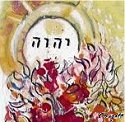
[ The following is related to our Torah reading this week, parashat Acharei Mot... ]
05.06.16 (Nisan 28, 5776) We read in our Torah for this week (i.e., Acharei Mot): "in this way (בְּזאת) Aaron shall come into the Holy place: with a bull from the herd for a sin offering and a ram for a burnt offering" (Lev. 16:3). Here the sages note the word b'zot (בְּזאת), meaning "in this way," is numerically equivalent to the Hebrew word shafal (שָׁפָל), meaning "fallen," "broken," "made low," or "humble," which suggests that the way to enter the holy place is by means of humility... On the other hand it is written: "the arrogant cannot stand in God's presence" (Psalm 5:5) because pride blinds the heart from apprehending Reality. Indeed the word translated "arrogant" in Psalm 5:5 is hollelim (הוֹלְלִים), literally, the "shining ones" who praise themselves but are spiritually regarded as לֹא שָׁפוּי, or "insane." Our Torah verse teaches that we can only come before the Divine Presence with "fear and trembling," that is, by understanding the truth of our radical need for deliverance and healing...
 |
Doing Faith...
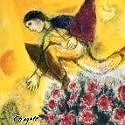
[ The following is related to our Torah reading this week, parashat Acharei Mot... ]
05.06.16 (Nisan 28, 5776) From our Torah portion this week we read: "You shall keep my decrees and my judgments, the pursuit of which man shall live: I am the LORD" (Lev. 18:5). The Kotzker Rebbe advised reading this verse as "You shall keep my decrees and judgments to bring life into them," meaning that we should bring all our heart, soul, and strength into the teaching of Torah. The commandments nourish the soul as food does the body. Just as we seek to make our food flavorful, so we seek to observe the truth with conviction and joy. "And let the beauty of the LORD our God be upon us: and establish the work of our hands upon us; yes, establish the work of our hands" (Psalm 90:17).
וִיהִי נעַם אֲדנָי אֱלהֵינוּ עָלֵינוּ
וּמַעֲשֵׂה יָדֵינוּ כּוֹנְנָה עָלֵינוּ
וּמַעֲשֵׂה יָדֵינוּ כּוֹנְנֵהוּ
ye·hi · no·am · Adonai · E·lo·hei·nu · a·lei·nu,
u·ma·a·seh · ya·dei·nu · ko·ne·nah · a·lei·nu,
u·ma·a·seh · ya·dei·nu · ko·ne·nei·hu

"May the beauty of the Lord our God be upon us,
and establish the work of our hands upon us;
yea, establish the work of our hands!"
(Psalm 90:17)
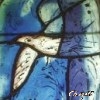
Download Study Card
God in your Midst...

05.06.16 (Nisan 28, 5776) In our Torah for this week (Acharei Mot) is a wonderful verse (Lev. 16:16) which states that the LORD "dwells with them in the midst of their contamination" (הַשּׁכֵן אִתָּם בְּתוֹךְ טֻמְאתָם). Even though the people were unclean (i.e., defiled by tumah), the Divine Presence (Shekhinah) was not removed, and the means for reconciliation were provided... This verse should encourage us to do teshuvah and find hope, even in the midst of our own struggle with evil. To those who lament over their sins, feeling as if they are beyond redemption, the LORD says: "I am with you there – in the midst of your suffering." Amen, God never leaves nor forsakes us, and even if were to "make our bed in hell," He is present with us (Psalm 139:8). As the Berditchever Rebbe once said: "You can be for God, and you can be against God, but you cannot be without God." Amen! The One who named Faithful and True can never deny the reality of his passion and care for you...
אַל־תִּירָא כִּי עִמְּךָ־אָנִי אַל־תִּשְׁתָּע כִּי־אֲנִי אֱלהֶיךָ
אִמַּצְתִּיךָ אַף־עֲזַרְתִּיךָ אַף־תְּמַכְתִּיךָ בִּימִין צִדְקִי
al ti·ra ki im·me·kha a·ni; al tish·ta ki a·ni E·lo·he·kha
im·matz·ti·kha af a·zar·ti·kha, af te·makh·ti·kha bi·min tzid·ki

"Fear not, for I am with you; be not dismayed, for I am your God;
I will strengthen you, I will help you, I will uphold you with my righteous right hand."
(Isa. 41:10)

Download Study Card
This is a word for the exiles of every age: Be not afraid - al-tirah – not of man, nor of war, nor of tribulation, nor even of death itself (Rom. 8:35-39). If God is for us, then who is able to stand against us? "In God I trust; I shall not be afraid. What can man do to me? (Psalm 56:11). Indeed, Yeshua came to die to destroy both the works of the devil and the power of death itself, in order to "release all those who through fear of death were subject to lifelong slavery" (1 John 3:8; Heb. 2:14-15). The resurrection of the Messiah is the focal point of history - not the "dust of death." Death does not have the final word, but rather life, peace, and love. Because Yeshua is alive, we also shall live (John 14:19); because of Yeshua's victory, we can now walk without fear: al-tirah, "Fear not, for I Am with you."
"Fear not, for I am with you..." אַל־תִּירָא כִּי עִמְּךָ־אָנִי. What we need most of all is right here, present in this hour, whether we're conscious of it or not. God is with you, even if you feel alone, lost in darkness, unclean, afraid... "Dear Lord Jesus, I don't know who I am, I don't know where I am, and I don't know what I am, but please love me" (prayer of a sufferer from Alzheimer's disease). That's what we need most, to trust that we are safe in God's love, and that's the ultimate message of our atonement in Messiah.
 |
Our Need for Atonement...
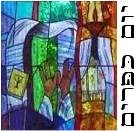
[ Our Torah this week (Acharei Mot) explains the Yom Kippur (Day of Atonement) ritual... ]
05.05.16 (Nisan 27, 5776) Yeshua's first words of public ministry were "Repent and believe the gospel" (Mark 1:15). The word "repent" is metanao (μετανοέω), meaning "change your thinking" (i.e., transcend your fears and prejudices) and the word "gospel" means "good news" (i.e., εὐαγγέλιον, from , εὖ- "good," and ἄγγελος, "message"). We could therefore translate the verse as: "Change your thinking and believe the message of God's good will toward you." When the Apostle Paul later testified of his dramatic conversion experience on the Road to Damascus, the resurrected Messiah commissioned him to go to the Gentiles in order to "open their eyes, so that they may turn (ἐπιστρέφω) from darkness to light and from the power (i.e., ἐξουσία) of Satan to the power of God, that they may receive forgiveness of sins and a place among those who are sanctified by faith in me" (Acts 26:18).
Humanity's greatest need is to be loved and accepted by God, but this requires a solution to the problem of sin. A "good judgment" from heaven, however, cannot be obtained through self-justification or through "works of righteousness which we have done" (Titus 3:5). The "books" are opened in heaven with a detailed record of all our sinful acts (Rev. 20:12). The violation of God's law requires atonement. Yeshua is God's exclusively appointed Sin Bearer, and only by means of trusting in his sacrificial death on the cross are we are declared not guilty (or "justified") by faith. Only God can justify the ungodly (Rom. 4:5) and "clothes" us with His own righteousness (see Zech. 3:1-5). Salvation is of the Lord. In the end, the only righteousness that really matters is the righteousness of God... We must renounce all hope of other approaches or defenses. None of us is righteous, "no, not one" (Psalm 14:2-3; Rom. 3:10). All our righteousness is as "filthy rags" before the throne of Heaven: "We have all become like one who is unclean, and all our righteous deeds are like a polluted garment. We all fade like a leaf, and our iniquities, like the wind, take us away" (Isa. 64:6).
For more on this great topic see, "Yom Kippur and the Gospel..."
Behold the Goat of God...

[ Our Torah this week (Acharei Mot) explains the Yom Kippur (Day of Atonement) ritual... ]
05.05.16 (Nisan 27, 5776) The original Passover sacrifice (korban Pesach) was not given to the Levitical priesthood as a sin offering since it preceded Sinai and the giving of the laws concerning the sacrificial rites. In the same way, Yeshua's sacrifice was directed from Heaven itself by means of the prophetic office of Malki-Tzedek (מַלְכִּי־צֶדֶק) - a higher order of priesthood (Gen. 14:18; Psalm 110:4; Heb. 7).
And while we are perhaps more familiar with the Biblical imagery of Messiah as "the Lamb of God" (שֵׂה הָאֱלהִים) who takes away the sins of the world (John 1:29), it is nonetheless true that he is also depicted as "the Goat of God" (עֵז הַאֱלהִים) who purifies us from iniquity and offers his blood for our everlasting atonement... As the "Lamb of God" Yeshua provides redemption from slavery to Satan and freedom from the wrath of God. By means of his shed blood and broken body, the plague of death passes over us and we are set free to serve God (this is the Passover connection). As the "Goat of God," Yeshua provides both personal cleansing (i.e., "atonement" for sin: the Greek word (ἱλαστήριον) is used in the LXX for the kapporet (i.e., mercy seat) in the Holy of Holies that was sprinkled with the blood of the sacrifice on Yom Kippur) as our personal Mediator before the Father, as well as corporate cleansing for ethnic Israel at the end of the Great Tribulation period. At that time Yeshua will function as Israel's true High Priest whose sacrifice is applied for Israel's purification, and so "all Israel shall be saved" (this is the Yom Kippur connection).
Note: For more on this see, "Yom Kippur and the Gospel" and "Behold, the Goat of God."
 |
Kaddish and Providence...

05.05.16 (Nisan 27, 5776) Since we trust that "all things work together for good" (Rom. 8:28), we bless God for perceived evil as well as for perceived good, since all circumstances of life come from the hand of the LORD our God. We believe in an all-powerful, supreme LORD who has not abandoned the world, but who actively sustains and upholds it with benevolent intent. When bad things happen to the righteous, we trust in God's personal care for their ultimate good, despite their present troubles. "Though he slay me, I will trust in Him" (Job 13:15). This is the heart behind the Kaddish, the mourner's prayer, that expresses acceptance of God's world, despite the pain, sorrow, loss, and so on.
The term hashgachah pratit (הַשְׁגָּחָה פְּרָטִית) refers to God's personal supervision of our lives (hashgachah means "supervision," and pratit means "individual" or "particular"). Since He is the Master of the Universe, God's supervision reaches to the smallest of details of creation - from subatomic particles to the great motions of the cosmos. God not only calls each star by its own name (Psalm 147:4), but knows each particular lily and sparrow (Matt. 6:28-30, 10:29). Each person created in the likeness of God is therefore under the direct, personal supervision of God Himself -- whether that soul is conscious of that fact or not. As Yeshua said, even the hairs on your head are all numbered (Matt. 10:30). Indeed, the God of Israel is called אלהֵי הָרוּחת לְכָל־בָּשָׂר / Elohei ha-ruchot lekhol-basar: "The God of the spirits of all flesh" (Num. 16:22), and that means He is LORD even over those who vainly attempt to suppress His Presence and reality. "Can a man hide himself in secret places so that I cannot see him? declares the LORD. Do I not fill heaven and earth?" (Jer. 23:24).
The Talmud says that when Moses asked God, "Please show me your glory" (Exod. 33:18), he was asking for God's vindication in the light of the gnawing question: "Why do the righteous suffer while the wicked prosper?" Moses was not given an explicit answer, and some of the sages said he wrote the enigmatic Book of Job to demonstrate that the question can only be reduced to God's inscrutable will: "Where were you when I laid the earth's foundation?" (Job 38:4). In other words, the question can only be answered by the One who knows the beginning from the end, the Infinite One who sees the implications and concatenation of all things. As finite beings, we see only a fraction of the big picture, and therefore we must yield our trust to the Wisdom and Power of Almighty God (Deut. 32:4).
It is written, "Your eyes saw me when I was inside the womb. All the days ordained for me were recorded in your scroll before one of them came into existence" (Psalm 139:16). In light of God's providential ordering of our lives, Blaise Pascal asked, "What is left for us but to unite our will to that of God himself, to will in him, with him, and for him the thing that he has eternally willed in us and for us." The Mishnah says it this way: "Do His will as if it was your will that He may do your will as if it was His will" (Avot 2:4). In other words, what else can we do but learn to trust, accept, and to say "yes" to life -- even if at times we may feel like orphans, lost in a fatherless world... All our days are recorded in God's scroll...
גָּלְמִי רָאוּ עֵינֶיךָ וְעַל־סִפְרְךָ כֻּלָּם יִכָּתֵבוּ
יָמִים יֻצָּרוּ וְלא אֶחָד בָּהֶם
gol·mi · ra'u · ei·ne·kha · vw'al-sif·re·kha · kul·lam · yik·ka·tei·vu
ya·mim · yutz·tza·ru · ve·lo · e·chad · ba·hem

"Your eyes saw me when I was inside the womb. All the days ordained for me
were recorded in your scroll before one of them came into existence."
(Psalm 139:16)

Therefore may God "teach us to number our days to get a heart of wisdom" (Psalm 90:12). The sages say on the day of death, one considers one's life as if it had been a single day... Life goes by so quickly, and we never know when our personal Rosh Hashanah will come. "No one knows the day or hour..." That's why it is so vital to be healed and to turn to God while there is still time. So turn to him today and bacharta ba'chayim (בָּחַרְתָּ בַּחַיִּים) - "choose life!" "For this commandment (of turning to God in teshuvah) is not hidden from you, and it is not far away. It is not in heaven... nor across the sea.... Rather, the matter is very near you - in your mouth and your heart - to do it" (Deut. 30:11-14; Rom. 10:8-13).
For more on this, see the meditation entitled "Paradox and Presence."
The Narrow Door...

05.05.16 (Nisan 27, 5776) "Strive to enter through the narrow door. For many, I tell you, will seek to enter and will not be able" (Luke 13:24). The narrow door is the way of humility, assuming a low position, crawling, if you will, and making yourself small... The large, wide-open door is designed for the crowd and its idols. Beware of the world that seeks to assimilate the soul: beware of becoming part of the crowd! The individual is lost and overwhelmed in the midst of the crowd and its momentum. The crowd assimilates the soul, laughs at the notion of individual responsibility, and abandons itself to the gravity of purely natural forces... The life of faith, on the other hand, refuses to regard the individual human heart as a triviality, a joke. Faith is an individual struggle, a walk into unknowing; it is the way of the sojourner who feels uneasy in this world of shadows... God is always with us and helps us stay strong and resolute, even as we struggle through the darkness of this age. Press on, chaverim! Do not lose sight of your high calling in Yeshua.
 |
Beauty for Ashes...
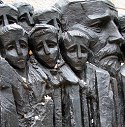
[ Yom HaShoah, or "Holocaust Remembrance Day," begins this evening at sundown... ]
05.04.16 (Nisan 26, 5776) Some people mark the date of November 9, 1938 as the start of the Jewish Holocaust. On that dreadful night - called Kristallnacht, "the Night of Broken Glass" - thousands of Germans, organized by the Nazis, destroyed over 1,000 synagogues, burned precious Torah scrolls and prayer books in town squares, ransacked and looted over 7,000 Jewish businesses, and invaded and terrorized many Jewish homes. Many Jews were killed during the attacks, and 30,000 Jewish men were arrested and taken away to the concentration camps. Kristallnacht was followed by further persecution of the Jews and is viewed by most historians as the pogram that initiated the infamous "Final Solution."
To readily identify who was a Jew to the authorities, Hitler ordered all subjugated peoples of Jewish descent to wear yellow stars of David on their clothing. Hitler relied on non-Jews to spy on and identify all those who did not comply. When the order to wear the star was issued in Holland, however, an underground newspaper made 300,000 yellow stars that said, "Jews and non-Jews stand united in their struggle," and distributed them to the public to express their solidarity with the plight of the Jewish people. In Denmark, too, the "yellow star law" was rebuffed, and King Christian X was reported to have said that if the law were to be enforced by the Nazis, he pledged to wear one himself, as would all the other people of Denmark. Later, the Danish resistance movement (with the help of ordinary Danish citizens) opposed the Nazis by safely evacuating the Jews to nearby neutral Sweden.
By far the largest act of civil resistance against Hitler and the Nazis occurred during the Warsaw Ghetto Uprising, which took place in Poland on the eve of Passover, April 19, 1943. Unfortunately most Jews were unable to defend themselves because oppressive gun control laws had disarmed the population; nevertheless, it still took the Nazi war machine nearly a month to vanquish the ghetto - longer than it took for Hitler to overcome the entire country of Poland. Because the Warsaw Ghetto Uprising symbolized Jewish resistance against the Nazis, in 1953, after the State of Israel was formed, it was proposed to observe Yom HaShoah on the anniversary of the uprising -- on the 14th of Nisan -- but this date was rejected because it marked the start of Passover. After considerable debate, the memorial was postponed until after the Passover holiday week was over, on the 27th of Nisan, eight days before Yom Ha'atzma'ut, or Israeli Independence Day.
While there is no official "haggadah" for the Yom HaShoah memorial, it is traditional to light a yellow yahrzeit candle for those who died, to attend a Yom HaShoah memorial service, and to recite kaddish. Some people prepare a lavish meal using recipes written from memory by the starving women of Theresienstadt (salvaged after the war). Many of these recipes are for rich desserts and cakes, recalling days of joy before the women and their families were rounded up and brought to the concentration camps. During the memorial meal, stories of Jews who died are told, as well of those of survivors. Many survivors tell stories about the "hidden children" who were saved by righteous Gentiles (חֲסִידֵי אוּמוֹת הָעוֹלָם). These young survivors were either hidden in secret places (like Anne Frank) or were "adopted" by Christian families who pretended they were their own children.
What does the Holocaust mean to you? How do you do "theology after Auschwitz?" Does the Shoah rouse you to be vigilant against the rise of political evil in the world? Does its warn you how about how easy it is for you to "tune out" - to close your eyes, ears, and nose to the presence of evil and the practice of social injustice and crimes against humanity? As Elie Wiesel said, "Indifference to evil is evil." Hitler not only murdered millions of Jews (including over a million Jewish children), but he also murdered millions of non-Jews whom he regarded as a threat to his political ideology and to "homeland security." We must never forget the horrors of Holocaust because it could happen again - and to believe otherwise is to forget the radical evil lurking within human nature. Germany was perhaps the greatest nation of Europe, cultured, brilliant, "Christian," enlightened, with a rich history of intellectual and artistic genius -- and yet it nevertheless practiced unspeakable barbarity and tolerated massive and heartless genocide against the Jewish people...
קוּמִי רנִּי בַלַּיְלָה לְראשׁ אַשְׁמֻרוֹת
שִׁפְכִי כַמַּיִם לִבֵּךְ נכַח פְּנֵי אֲדנָי
שְׂאִי אֵלָיו כַּפַּיִךְ עַל־נֶפֶשׁ עוֹלָלַיִךְ
ku·mi · ro·ni · va·lai·lah · le·rosh · ash·mu·rot
shif·khi · kha·ma·yim · lib·bekh · no·khach · pe·nei · a·do·nai
se·i · e·lav · ka·pa·yikh · al · ne·fesh · o·la·lai·yikh

"Arise, cry out in the night, at the beginning of the night watches!
Pour out your heart like water before the face of the LORD!
Lift your hands to him for the lives of your children."
(Lam. 2:19)

"I believe. I believe in the sun even when it is not shining; I believe in love even when feeling it not; and I believe in God, even when God is silent" (from an anonymous poem found on the wall of a cellar in Cologne, Germany, where some Jews hid from the Nazis).
"The opposite of love is not hate, it's indifference. The opposite of art is not ugliness, it's indifference. The opposite of faith is not heresy, it's indifference. And the opposite of life is not death, it's indifference." - Elie Weisel
"Do you know what hurts so very much? It's love. Love is the strongest force in the world, and when it is blocked that means pain. There are two things we can do when this happens. We can kill that love so that it stops hurting. But then of course part of us dies, too. Or we can ask God to open up another route for that love to travel." - Holocaust Survivor and Righteous Gentile, Corrie ten Boom
Though we can't control what happens in this dangerous world, we can trust that God is working all things together for good, even during times of severe testing, and even in things that are blatantly evil (Rom. 8:28; Gen. 50:20). And while we instinctively recoil at the prospect of physical death, there are decidedly things worse than death itself, namely, losing hope in life, walking in the darkness of despair, living a joyless existence because of fear. As much as we abhor evil - and we must resist it with all our hearts - even more must we love the good - and cling to God (וּלְדָבְקָה־בוֹ) with all that is within us.
During the evening of Yom HaShoah we watched the 1975 movie, "The Hiding Place," which retells the story of Corrie ten Boom's life. The movie ends with a quote from her sister Betsie, who died at the Ravensbrück concentration camp: "There is no pit so deep that He [God] is not deeper still. For more on this, see "Beauty for Ashes: Further thoughts on the Shoah..."
 |
Humility and Love...
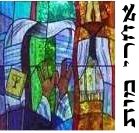
[ The following is related to our Torah reading this week, parashat Acharei Mot... ]
05.04.16 (Nisan 26, 5776) Regarding the verse from our Torah portion, "The LORD spoke to Moses after the death (אַחֲרֵי מוֹת) of the two sons of Aaron, when they drew near before the LORD and died" (Lev 16:1), the sages note the principle "to whom much is given, much is required" (Luke 12:48), particularly regarding service to God and living its consequence... Loving God requires both yearning for connection with him combined with a commitment to express his will in the mundane affairs of life. The sin of Aaron's sons was not that they sought closeness to God, but that their desire did not bear fruit in their practical experience. And such is the danger of those who zealously offer "strange fire" by seeking God at the expense of the lowliness of everyday experience. Some people seek for visions, signs and wonders, mystical revelations, prosperity, and so on, but they do so at the cost of their duty to make a Sanctuary for God in the midst of their everyday existence. May the LORD protect us and help us draw near to Him in the truth.
 |
Yom HaShoah - יוֹם הַשּׁוֹאָה

[ Yom HaShoah, or "Holocaust Remembrance Day," begins this evening at sunset... ]
05.04.16 (Nisan 26, 5776) Yom HaShoah, or Holocaust Remembrance Day, takes place on the 27th of Nisan, which this year begins Wednesday, May 4th (at sundown) and runs until after sundown the following day. Shoah is the Hebrew word for "disaster" and is another name used to refer to the European Holocaust, when six million Jews - including one and a half million children - were systematically murdered by the Nazis during World War II.
Yom HaShoah was established as a national holiday by the Israeli Knesset on August 19, 1953, though at first there were many rabbis who objected to its establishment because Tishah B'Av already commemorated the multiple tragedies of the Jewish people. These rabbis further reasoned that were it not for the exile caused by the destruction of the Second Temple (commemorated during Tishah B'Av), the European Holocaust itself would not have occurred, and therefore an additional holiday was superfluous. Nevertheless, the emotional pain of the Holocaust was so great that the objection of the rabbis was rejected by the people, and the only question left was when Yom HaShoah should be observed. Many people called for a Nisan 15 date, since that marked the time of Warsaw Ghetto Uprising, but since Nisan 15 marks the second day of Passover, it was rejected. After various dates were suggested, the date of Nisan 27 was finally accepted -- after Passover Week but still during the time of the uprising in Warsaw.
Despite being universally recognized as a holiday by Jews around the world, there is no official liturgy to observe Yom HaShoah... In Israel, during the morning of Nisan 27, a siren sounds, all activity stops, and people stand in honor of those who died. Memorials and vigils are observed, often with a candle lighting ceremony in honor of the six million Holocaust victims. Many hold name-reading ceremonies to memorialize those who were murdered.
The Shoah forces us to deal with the moral problem of evil in the world - that is, how could an all-loving and all-powerful God permit the rise of Nazi Germany and the murder of the Jewish people? Post-Holocaust theology is a difficult subject, and we must be careful to tread softly and with due reverence... But it is imperative that we never forget what happened to the Jewish people, just as we must always be vigilant for political power that seeks to impose fascist control or that seeks to "scapegoat" other people for political purposes... Tragically, the underying spirit of Nazi ideology is still operational in this twisted world, as evidenced by the spurious idea of "homeland security" and other police state tactics that are now routinely used to control people for political and economic purposes....
 |
Love and Reproof...

[ The following is related to our Torah reading this week, parashat Acharei Mot... ]
05.04.16 (Nisan 26, 5776) In our Torah portion this week there is a wonderful verse (Lev. 16:16) that states that the LORD "dwells with them in the midst of their contamination" (הַשּׁכֵן אִתָּם בְּתוֹךְ טֻמְאתָם). Even though the people were unclean (i.e., defiled by sin and tumah), the Divine Presence was not removed and the means for reconciliation were provided... Aren't you glad that the love of God doesn't "stop there" (i.e., with a verdict about our sinful condition) but goes beyond the offense to provide remedy and hope?
Yeshua said, "Where two or three are gathered in my name, there I AM in the midst of them" (Matt. 18:20). This is expressed by the Hebrew word for love (i.e., ahavah: אהבה), the gematria of which is thirteen, but when shared with another is multiplied: 13 x 2 = 26 -- the same value for the name of the LORD (יהוה). The commandment, "you shall love your neighbor as yourself" (וְאָהַבְתָּ לְרֵעֲךָ כָּמוֹךָ) thus awakens in the other the same kind of love for you -- and the result will be a "double love" -- or the love of God (אַהֲבַת הָאֱלהִים). Of course this isn't easy, but immediately after giving the commandment, God declares: "I AM the LORD" (אֲנִי יְהוָה), which the sages traditionally interpret to mean, "I, the LORD, will help you fulfill this commandment if you sincerely wish to do so."
Our Lord Yeshua extended the "like-for-like" nature of love (with its implicit appeal to self-interest) by commanding us to (literally) love our enemies. Most of us find rationalizations to excuse ourselves from this duty, of course, and we are only too glad to accept the propaganda of the world that wars are "patriotic," that vengeance is "just," that people who are different from us are to be held in suspicion, and so on. Yeshua, however, says: "Love your enemies and pray for those who persecute you, so that you may be sons of your Father who is in heaven" (Matt. 5:44-45). Love is more important than even truth, or rather, love is the ground or foundation of the truth... Love is truth, in other words, at least from the perspective of Heaven. God doesn't call out people to become "professors" as much as He calls people to become lovers... It is better to love than to be "right." Love is willing to embrace the wrong in others in redemptive hope. If we find ourselves unwilling to extend such grace, perhaps it's because we are struggling to accept it as our own....
For more on this topic, see the Torah article "Love and Reproof."
 |
Extraordinary Encounters...

[ The following is related to our Torah reading this week, parashat Acharei Mot... ]
05.03.16 (Nisan 25, 5776) We "sanctify" our hearts whenever we consciously focus on what is sacred, awesome, wonderful, and glorious about Reality, and in particular, on the Living God, oseh shamayim va'aretz (עשֵׂה שָׁמַיִם וָאָרֶץ), the Maker of Heaven and Earth, and the great salvation we have in Yeshua. In our Torah portion this week (Acharei Mot) we read: "You shall not do as they do (לא תַעֲשׂוּ) in the land of Egypt, where you lived, and you shall not do as they do (לא תַעֲשׂוּ) in the land of Canaan, to which I am bringing you. You shall not walk in their statutes" (Lev. 18:3). In other words, we are not to follow the crowd, to appeal to the status quo, or to mimic the customs of the world because we are a visionary people. Being in a vital relationship with God means separating from the ordinary and mundane, leaving our "original homeland" behind us and crossing over to the realm of blessing. Abraham had to leave the land of his father before he could receive the promise; the Israelites had to trek far into the desert before they received the vision at Sinai, and we have to leave our old lives behind to partake of newness of life. There is a radical break from the past -- we are transformed, reborn, and made into new creations by the miracle of God (2 Cor. 5:17). "Being holy" therefore means coming alive and looking away from that which deadens the spirit (Col. 3:1-4). Behold, the LORD God of Israel makes all things new.
The call to be holy is radical and completely contrary to the world and its messages of conditional approval. Worldly culture flatters itself by making a pretense of true originality and genuine love. It imagines itself to be "cool," unconventional, creative, sophisticated, artistic, and so on, but really it is often trite, uninspired, boring, and stupidly tragic. To be truly original means encountering God in your daily experience, struggling through the day in faith, disregarding the clamor and demands of popular culture and its idolatry (i.e., fads, fashions, trends, etc.). God calls his people to come alive, to be new, and to experience abundant life; we are to treasure the unseen, the possible, and to keep faith in the healing good that will overwhelm all darkness. Now that's radical; that's original; that's powerful; but the world and its fads, idols, political heroes and pop stars are nothing but vanity and folly...
Note the connection between worldliness and idolatry, since idolatry essentially involves trying to find your identity, your worth, your satisfaction, and your ultimate fulfillment in the realm of the transitory and the finite (i.e., the world) rather than in God.... We are (rightly) warned against the vices of "worldliness" and are admonished to abstain from popular culture and its spurious values, but note well that worldliness extends well beyond all this, since it concerns understanding the identity and nature of the person as a whole. The fruit of worldliness is the result of being rooted in this world rather than in God's kingdom. The various desires of the human heart - even the desire for "normal things" like personal happiness in this world - may be regarded as "worldly" if they are devoid of submission to God and His rule. Conversely, even Christian workers may be "worldly" if they base their identity in what they do rather than who they are in the Messiah...
We are "in" but not "of" the world; we are embedded within our culture to be salt and light, and that means we stay true to our vision and relationship with the LORD our God... We don't have to reinvent the wheel, however, since we learn from one another and especially from the testimony of our holy Scriptures, but nevertheless we must personally venture out and encounter God within our own hearts, trusting in his love for our everlasting healing. B'chol dor va'dor: in each generation an individual should look upon himself or herself as having been personally delivered from Egypt. To be efficacious, the message of the Passover Lamb must be personally received by the heart of faith.
Renew the affirmation of faith and know who you are: "If then you have been raised with Messiah, seek the things that are above (τὰ ἄνω ζητεῖτε), where the Messiah is seated at the right hand of God; focus your thoughts on the things above - not on things here on earth - for you have died, and your life has been hidden with Messiah in God. Then when the Messiah, who is your life, appears, you too will appear with him in glory" (Col. 3:1-4).
 |
Deliver Us from Evil...

[ Yom HaShoah, or Holocaust Memorial Day, is observed May 4th (and 5th) this year... ]
05.02.16 (Nisan 24, 5776) In hindsight of his harrowing experience at the death camps, Holocaust survivor Viktor E. Frankl wrote: "No man should judge unless he asks himself in absolute honesty whether in a similar situation he might not have done the same" (Man's Search for Meaning, 1984 edition). There is a "shadow" or darker side to ourselves that we normally keep hidden from view, even from ourselves. Yeshua said "out of the heart come evil thoughts, murder, adultery, sexual immorality, theft, false witness, slander, and these are what defile a person" (Matt. 15:19-20). If you were given a magic ring which when placed on your finger made you invisible, would your behavior change? Would you be moral if you were entirely sure that you wouldn't be held accountable? Why is it difficult to understand our true motives, to "own" the darker impulses that sometimes rise within us? Each of us can act like a petty Pharaoh, and - dare I say it - even like a cruel Nazi at times, blaming others to excuse our own evil ways... When we come to the light to confess the truth, we become more aware of what we really need, and we can ask God for healing; we then can forgive ourselves and begin to "lift off" our stuff from others.
עָקב הַלֵּב מִכּל וְאָנֻשׁ הוּא
מִי יֵדָעֶנּוּ
a·kov · ha·lev · mi·kol · ve·a·nush · hu
mi · ye·dei·nu?

"The heart is deceitful above all things and incurably sick
- who can understand it? (Jer. 17:9)
The heart is deceitful above all things, and incurably sick - mi yadeinu? - who can know it? But how is the heart sick? By seeking excuses to evade the truth of its great need; by denying its own inner poverty... "No person is saved except by grace, yes; but there is one sin that makes grace impossible, and that is dishonesty; and there is one thing God must unconditionally require, and that is honesty" (Kierkegaard).
Julian of Norwich said, "All shall be well, and all shall be well and all manner of thing shall be well," and yet the darkest pitch of depression is precisely the inability to take hold of such hope... Faith in the midst of darkness must yet affirm that despite own sin, our own wretchedness, nothing will hinder nor overcome the working of God's goodness...
Holocaust Memorial Day...

[ Yom HaShoah begins Wednesday May 4th (at sundown) and runs through the following day. ]
05.01.16 (Nisan 23, 5776) Shoah (שׁוֹאֵב) is the Hebrew word for "ruin" or "destruction" and is another name used to refer to the European Holocaust, when six million Jews - including one and a half million children - were systematically murdered by the Nazis during World War II. After much impassioned debate, in 1953 the Israeli Knesset designated Nisan 27 as Yom HaShoah (יוֹם הַשּׁוֹאַה), or Holocaust Remembrance Day.
During this day, in Israel, a morning siren sounds, all activity stops, and people stand in honor of those who died during the atrocities of those years. Jews around the world hold memorials and vigils, often lighting six candles in honor of the six million Holocaust victims. Many hold name-reading ceremonies to memorialize those who were murdered. This year, Yom HaShoah begins Wed, May 4th at sundown and runs through the following day.
Parashat Acharei Mot...

05.01.16 (Nisan 23, 5776) Our Torah for this week is called Acharei Mot (אַחֲרֵי מוֹת). This portion transitions from the preceding instructions regarding ritual purity (tahora) to recall the tragic incident of Nadab and Abihu, the two sons of Aaron who were killed when they offered "strange fire" upon the Altar of Incense during the dedication of the Tabernacle (see Lev. 10:1-2). Because these priests came close to the Holy of Holies in an incorrect manner, the LORD further commanded Moses to instruct Aaron that he should enter the innermost chamber only in a carefully prescribed manner once a year - on the tenth day of the seventh month - during the sacred time called Yom Kippur (i.e., the "Day of Atonement").
On this most solemn day, Aaron was commanded to immerse himself in a mikveh (pool of fresh water) and to dress in all-white linen. He then was instructed to slaughter a bull as a personal sin offering. Aaron then brought some ketoret (incense) to burn within the Holy of Holies before returning to sprinkle the blood of the sin offering seven times before the Ark of the Covenant (i.e., the kapporet or "Mercy Seat"). Aaron repeated this procedure using the blood of one of two goats that was selected (by lot) to be slaughtered as a sin offering on behalf of the people. After this, Aaron took more of the sacrificial blood and purified the Altar of Incense and the other furnishings of the Tabernacle. Later, the fat of these sacrifices was burned on the Copper Altar in the courtyard, though the hide and the flesh were to be entirely burned outside the camp.
After purifying the Tabernacle, Aaron went to the gate of the courtyard and laid both hands upon the head of the other goat (designated "for Azazel," a name for the accusing angel) while confessing all of the sins and transgressions of the people. This "scapegoat" was not slaughtered, however, but was driven away into the wilderness, carrying "all their iniquities unto a land not inhabited." Finally, Aaron returned to the Tent, washed and changed his clothes, and offered two more burnt offerings – one for himself and one for the people – to complete the purification process.
This elaborate ritual was ordained to be a decree for Israel, and the day of Yom Kippur was to be observed every year as a time of "affliction and mourning" for all the people. The portion ends with further instructions about making sacrifices, including the prohibition against offering sacrifices apart from the rites of the Tabernacle. The consumption of blood is explicitly forbidden, since blood was reserved for sacrificial purposes upon the altar.
|

































































